a&e features
Former Avalon singer on coming out, getting ousted and where he is today
Michael Passons was founding member of CCM supergroup known for ‘Testify to Love’
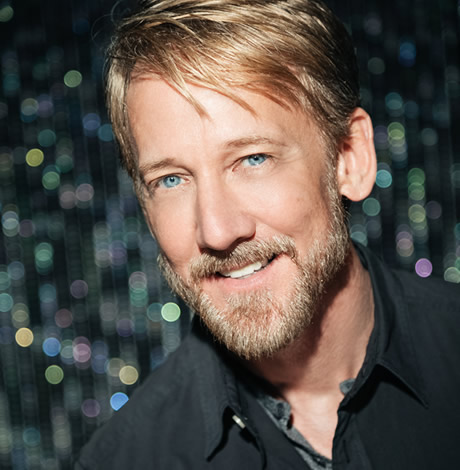
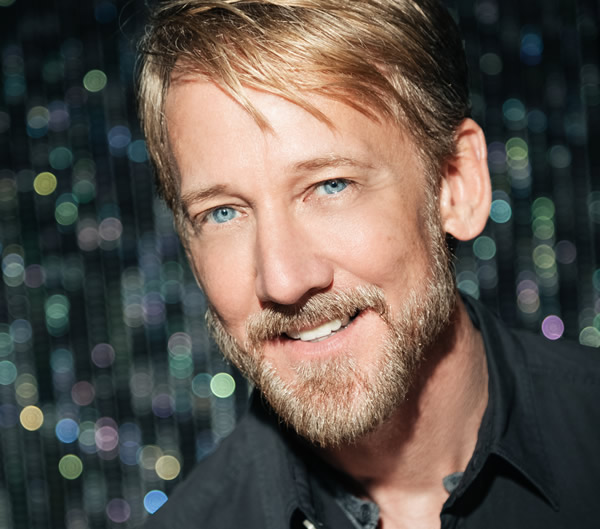
Fans of the Christian pop group Avalon always wondered why founding member Michael Passons resigned abruptly in 2003 and then seemed to drop off the face of the earth.
There was talk of a solo album but none materialized. The official word was that he was “moving on to other things.”
The group had had a wildly successful run. Founded in the mid-’90s, Avalon released its self-titled debut album in 1996 on Sparrow and four more (“A Maze of Grace” in 1997, “In a Different Light” in 1999, “Joy: a Christmas Collection” in 2000 and “Oxygen” in 2001) as well as a hits collection with new material (“Testify to Love: the Very Best of Avalon”) in 2003 racking up 19 No. 1 singles on the Billboard gospel charts, two RIAA-certified gold albums, six Dove Awards, an American Music Award and three Grammy nominations.
Initially there was a blond male and female singer and a brunette male and female singer to round out the foursome in ways that were both visually and sonically appealing. There was regular turnover in one of the “female” slots but Passons, Janna (nee Potter) Long and Jody McBrayer formed the group’s backbone all through its early and most successful years.
After years of silence, in September, Passons came out as gay on Josh Skinner’s “Jonah and the Whale” podcast and said he was fired from the group for declining to continue with “reparative” therapy. The podcast generated significant media buzz and was aggregated in mainstream outlets like Billboard and People.
Though candid and forthcoming in the podcast, there was more to the story. Passons, a 54-year-old Yazoo City, Miss., native, was chatty and candid in a 45-minute phone interview from his Nashville home on working in the CCM (contemporary Christian music) bubble, hiding his sexuality for so many years, why he opted to come out now and about the Dove Award he nabbed from Whitney Houston at the 1998 ceremony. His comments have been slightly edited for length.
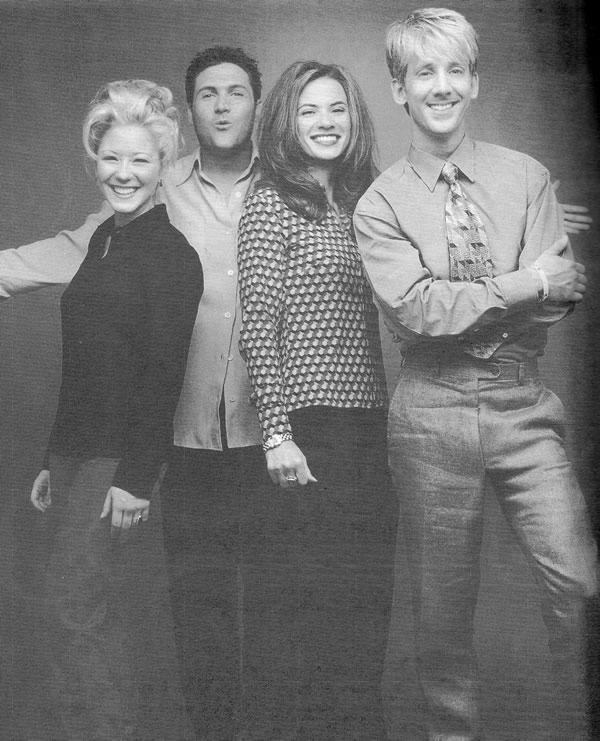
WASHINGTON BLADE: It was great to hear the podcast. It felt like you’d just kinda vanished.
MICHAEL PASSONS: I understand that people would see it that way because you’re just kind of out of the public eye when you’re not making music, not putting music out and doing interviews, and I had not done any of that pretty much in 17 years. And I didn’t really expect this podcast to get the attention that it did get. It was a bit of a surprise to me that there was so much of an interest in a 17-year-old story.
BLADE: Why did it feel like now was the right time? How did it come about?
PASSONS: It wasn’t some calculated move, I was approached by a friend who introduced me to Josh Skinner who has a podcast Jonah and the Whale and said would you like to be a guest? This particular podcast deals with an underwater moment in your life and I had previously had conversations with my family just a couple months earlier, just about my life and the truth of my life so I thought, “Well now is the perfect time,” so it really wasn’t planned out far in advance. An opportunity landed in my lap and I decided to tell the story.
BLADE: Had you been approached before?
PASSONS: Well, I’ve been pretty under the radar. I’ve been traveling the last 15 years with another Christian group, but only in the band. I play keys for Point of Grace. I wanted to keep my foot in the water … but I didn’t want to be the front guy … so I really hadn’t been approached by journalists at all until now.
BLADE: You tell in the podcast about how they came to your house for a meeting in 2003 and this all came to a head. How had they known you were gay in the first place? What led up to that meeting?
PASSONS: Well at that point I was 38 years old, I wasn’t married, I wasn’t dating, (so) rumors begin to swirl when you have that type of scenario and we had discussions about it several years before. So that’s when … they said to me I needed to go to therapy. It really was in 2002 that they wanted me to go to reparative therapy or at least go see a counselor or some guy who said his credentials were counseling gay people. So I did that to appease them but I knew it was a fruitless effort, and as I say in the podcast, that didn’t last very long. I told them I wasn’t going back to that. It had been a conversation for about a year or so before 2003.
BLADE: Did you have a pretty good relationship with them otherwise?
PASSONS: Well over the course of the eight years we were traveling together, I saw those people more than anyone else. Our schedule was so demanding and we toured almost nonstop. … So we did at the time have this family-type relationship but … groups often have a shorter shelf life than solo artists because there are multiple people with multiple goals and aspirations and so unless all four of us aligned, there were always going to be these times where one wants to do a solo deal or they think we should do this or go in this direction and so we kind of started growing apart in our vision. Jody and Janna wanted to do solo records and I thought that was something that was going to fracture the group and our brand and that did cause some tensions because the other two members really wanted to focus our efforts on the Avalon brand because that’s what was familiar to everyone. So over the years we became not as close and then of course you add something like this which kind of draws a line and you have to choose what side of the line you’re going to be on.
BLADE: Bear with me a sec, but I’m going to read you Jody’s quote to CCM Magazine in April, 2004 when he said: “We had a meeting at Michael’s house one day and he told us he was going to move on to other things. We sat and cried and felt like the rug had been pulled out from under us. Things had felt great with the new group and Michael seemed to get along and blend vocally with (then-new member) Melissa (Greene) really well. But Michael had been with us from the beginning and just felt it was time for him to do something else. It’s weird but since his departure, it seems everyone is looking for some scandalous thing to have happened there. It makes me just want to say, ‘Look, I’m sorry to disappoint you that we don’t have some juicy gossip or ‘Dynasty’ episode happening here.” Based on what you shared in the podcast, that was a gross mischaracterization of how it went down. Did you read that at the time? How did it make you feel?
PASSONS: At the time the record label and management held really right reins on us because they created the group, it was their idea. They wanted to find a group that was already in existence that was two guys, two girls. They couldn’t do it so they said, “Let’s just put one together,” so we never felt like we had ownership of much. … So when management and label say, “This is what you are to say,” it became kind of like a bullshit fest at that point. You just gotta stick with the story and that’s what Jody was doing, he was sticking with the story he was told to say. … That was just the way they chose to handle it at the time. … Interestingly enough, Jody reached out to me after the podcast aired and we had not really talked in 17 years other than bumping into each other in a restaurant and saying a quick hello. We met for about an hour we met at a park here in Nashville and just walked around and he apologized profusely and said his heart was broken when he was listening to that podcast. He was very sincere and I accepted what he had to say and I feel like our relationship has actually — there was some definite closure there as far as what I’d been feeling all of these years and so that was a good thing that came out of this and I’m glad he reached out to me.
The Blade invited McBrayer to comment. In response to the question, “Did you feel muzzled by the label?” he sent this response: “Absolutely muzzled. However I would have never ever said anything to hurt Michael’s reputation. We were asked for years about what happened and myself and my family refused to say anything that would put Michael in a bad light. We were given a statement and told to go with it. We did everything we were told at the time. … Michael knows I love him and hate how all of it went down and how he was treated by the industry. I’m so thankful he’s happy and grown beyond it all now. I will continue to protect him. He will always be family.”
BLADE: Was there any truth to what they were saying? Had you been considering a solo album?
PASSONS: No. I know my strengths and my strength was not as a solo artist. … I enjoyed the team mentality of a group. … I think fans and people outside the industry took the press release at face value but people inside the industry heard pretty quickly what had really happened. Gossip and rumors spread really quickly around Nashville so I just thought, “OK, I’m gonna just start life No. 3 here.” (chuckles)
BLADE: A few other big CCM artists eventually came out like Jennifer Knapp and Ray Boltz. Did you follow that or ever compare notes with them?
PASSONS: I don’t know either of those artists personally. I’ve never really interacted with them. I think we did a show once with Jennifer years and years ago but it was just mainly, “Hello, nice to meet you.” I applaud them for living their best life and telling their truth but I just never felt like mine was necessarily a story that needed to be told. I wasn’t a solo artist. I would get recognized occasionally. People would say, “Oh, you’re that guy who was in that group,” but I would say 80 percent of fans just knew me as the blond guy. So I didn’t feel like I had tons of name recognition or that my story mattered. But in the last few years, I wanted to be more truthful with my family so that’s really where all this came out of.
BLADE: Did anybody else from your CCM days reach out besides Jody?
PASSONS: I’ve received tons of texts and Instagram messages from friends from home, friends from college, fans, strangers. As far as the industry, some people that I haven’t seen in a while. It was very interesting. Amy Grant texted me and told me she listened and thought my story was beautiful in the way I told it and graceful and I appreciated that. Susan Ashton reached out and I haven’t seen her in years. She was very encouraging. She said, “You are seen and heard and loved.” Everything has been overwhelmingly positive.
BLADE: Did you get to know the other artists very well or have much interaction on the multi-artist tours you did like “Emmanuel” or “My Utmost”?
PASSONS: Yeah, we had a lot of time to just hang out, especially on the bus. You’re traveling late at night and everyone’s wired so you’re staying up and visiting. But we were really new artists at that time and we were thrown into a mix of all of these people that were our mentors, our heroes. We were fans of theirs and now we’re all of a sudden peers, just because of how Avalon came together. Our very first tour before we even sang a note on a record was “Young Messiah” in ’95. We had just come together weeks before and just had enough time to record one Christmas song so that we could sing that song on that tour and there we were next to 4 HIM and Point of Grace and Steven Curtis Chapman and Larnelle Harris and that was mind-blowing to be with all these great artists. But yes, everyone was very welcoming had lots of encouragement for us and advice and I actually really enjoyed those tours.
BLADE: I saw you guys once with Twila Paris. What was she like?
PASSONS: That was our first tour (the “Where I Stand Tour” in 1997). We did Young Messiah that Christmas and then we did our record, then we toured with Twila. We were definitely getting our feet wet just seeing how this industry was going to work … how we were gonna mesh as a group because we were thrown on stage and we had to find our blend. Live, It’s one thing to be in the studio and be mixed and blended but to sing live, the Twila Paris tour was really just where we began to hone our craft as a group and so yeah, that was wonderful. I had many good experiences wth that tour. We dd a spring tour and a fall tour with Twila and it was a long tour but we definitely leaned a lot.
BLADE: Is there anybody in CCM who struck you as markedly different from their public persona?
PASSONS: I feel like everyone would be a little different than what you perceive them to be because you only see a very structured view of them by the PR department of the record label. I really enjoyed getting to know Sandi Patty because when you listen to her music, you just don’t pick up on the edge that she has. She has this great sense of humor that’s a little edgy. I don’t know, my image of Sandi Patty was that she was always walking around in some state of meditation or sitting around in a prayer circle because when you’re growing up you just think of someone in such a reverent way because you respected their music so much and she was just she a cut up, she kidded around, she invited us to her home in Indiana at that point just to hang out with her family and I just I enjoyed seeing a whole different side of her. She’s a very strong personality, a strong woman and listening and singing along with her records, it was just good to see the other side of her.
BLADE: What have you been living on all these years?
PASSONS: I play for Point of Grace and also a friend of mine in town, an attorney and I actually work with her in her law practice and of course being friends with the boss, you can leave anytime and so I’m free to travel whenever I need to and want to so that allows me to hang out with Point of Grace and go where they go. 2020 has been interesting. Since March, we’ve only had two shows and they were very small, so it’s been really interesting year for sure.
BLADE: What denomination did you grow up in?
PASSONS: Southern Baptist. A little country church in Mississippi.
BLADE: Are there still elements of Baptist or evangelical theology you struggle with? Queer or otherwise?
PASSONS: I’m past struggling with it. Of course, it’s something I think about often but I don’t struggle with it any longer. … I’ve definitely got a different view of spiritualism. I don’t consider myself religious but I do believe in God and so I do have a spiritual life but it just doesn’t involve organized religion and that’s just where I’ve landed.
BLADE: But do you still believe the Christianity basics — Jesus died for our sins and rose on the third day and so on or is it a broader thing for you?
PASSONS: It’s a broader spiritual thing and like I said in my previous interview, I’m just in this place of my prayer to God is show me what is true. I’m not gonna close my mind to anything, I’m not going to say, “Oh this is what I was taught and I don’t believe that anymore,” I just want to step back and rebuild all those boxes, rebuild what my spirituality is, kind of like just implode it to ground level and let’s start again. I was taught by very well-intended people. All my Sunday School teachers in that little church, they didn’t have any malice, they were well-intended people teaching what they believed. We were spoon fed, so at some point in your life you have to just decide of all that information you took in, what do you really believe? I had to get to the point where I was OK disagreeing and not believing some of the things I was taught. it wasn’t disrespectful to those people, I just have to find my own way.
BLADE: Do you think the conservative, white evangelical world will ever become openly accepting of LGBT people? Is it a lost cause or could it be a whole different story in another generation?
PASSONS: I think there is hope. I’ve seen so much progress in Christian circles just in my lifetime that I never thought I would see. It’s pockets, it’s not widespread, but … I think there is hope. A lot of things used to be justified with scripture that they eventually came around on. (Author) Peter Gomes calls it “the last prejudice of the church.” … After I left, Avalon recorded a song called “Orphans of God,” which I thought was interesting that they were singing it because I was definitely an outcast to them. But now my friend (out country singer) Ty Herndon and Kristen Chenoweth are going to cover it for a Christmas release as a duet and they asked Melissa Greene and I to sing backing vocals on it so now it will take on a whole new meaning. It was a really nice, full circle moment.
BLADE: Did you keep up with what Avalon was doing much after you were kicked out?
PASSONS: No. It would have put me in a bad headspace.
BLADE: Have you had many boyfriends? Are you in a relationship now?
PASSONS: I am. I’m with a wonderful guy now and it’s going well.
BLADE: Not married though?
PASSONS: No, not married (laughs).
BLADE: How long was it before you were comfortable dating guys?
PASSONS: It took me a while, because when all that went down, I internalized a lot of things and I thought, “Well this is my fault,” type of thing. It really took many years for me to just work through all the junk and work through that cloud in my head and so it wasn’t like some big unleashing. It wasn’t like I left Avalon and just started living my best life, it definitely took awhile to repair the hurt that happened from those several years when Avalon was ending and all the things I went through at that point.
BLADE: Do you know of other LGBT people in CCM who are not out?
PASSONS: Yeah, I do. I feel for them because I know that panicky feeling I used to have, that someone might catch on. … But I think a lot of conservative Christians might be naive as to how many people are gay or bi in their church. You learn from a very early age to be a good actor.
BLADE: Who was your favorite Avalon producer to work with?
PASSONS: Brown Bannister produced most of the records when I was in the group. He’s, you know, such an icon in our industry and I have so much reverence for him and so much respect, so it was an honor to work with him. He actually brought out the best in me. There was something about just his people skills and he was just so kind and thoughtful in how he spoke with you and guided you through the recording process. He just took the time, even just to find the right microphone for me, because the mic in the studio can make a world of difference. I remember going through five or six mics before we found the right one. A lot of producers are just like, “OK let’s get this going, all right that’s great on to the next one.” He just took time to make it right and I appreciated that.
BLADE: How long did it take to make those albums on average?
PASSONS: When it came time to record, we would try to just block off weeks where we would just go in there and do vocals, vocals, vocals vocals and really mainly weekdays because we would go out on the weekends and do one-off, you know, weekend dates here and there. So we wouldn’t obviously do a new record in the midst of a tour because we’d want to tour the new record but during our one-offs we would get in there and try to get in it done and probably over the course of a month and a half, two months, we would have everything done.
BLADE: How involved were you all with the vocal arrangements? I always loved that outro and all those layers on “We Are the Reason,” for instance. How did you come up with all those intricate lines?
PASSONS: We had a great vocal vocal producer named Michael Mellett and he had been a studio singer in Nashville a long time and had toured with Billy Joel as a background singer. He would come in and help arrange our parts and he was amazing at it. And I remember he did work on our Christmas record and I remember that outro those alternate melodies that he helped us come up with, I loved that too. I felt like that really updated the song. It’s interesting because when we did it it was 20 years old and now it’s been 20 years since we did it, so it needs to be done again now. But it was my favorite song growing up. I used to sing it with an accompaniment tape at my little country church when I was a kid.
BLADE: Yeah, I love it too. Did (songwriter) David Meece ever say anything after you guys cut it?
PASSONS: Indirectly. I think he might have said something to Brown but we heard that he liked it.
BLADE: Who’s a celebrity who would exemplify your type?
PASSONS: (laughs) My type, wow. I’m definitely attracted to someone who is confident but not cocky, someone who has sensitivity but is not overly sensitive, someone who’s just confident in themselves, that’s a big attraction to me. If I were to throw out a celebrity I see a lot of those qualities in, and maybe I’m wrong, but someone like Bradley Cooper.
BLADE: Did you guys in Avalon have any say in choosing singles?
PASSONS: We were included in conversations but I feel like ultimately the label got what they wanted. There’s one little battle that we won and in retrospect not just one, but I just remember this instance, where the label disagreed with us about what we should call our second record and had we listened to the label, we probably would have sold a lot more. They wanted us to call it “Testify to Love” and we had no idea when we were naming the record and about to release it that that would be the one song that Avalon would be known for or that it be our biggest song ever. We thought “A Maze of Grace” was such a clever title. They disagreed but they let us do what we wanted. But who knew “Testify to Love” would become such a huge song for us?
BLADE: Was (Sparrow president) Bill Hearn around much?
PASSONS: We would see him periodically and even his father Billy Ray, who started the company, they’re both deceased now, but they were very approachable. They weren’t always in our meetings because we were more with A&R and publicity and stylists but when they were around, they were very approachable, very hands on.
BLADE: When you win a Dove Award, did you each get one or just one for the group?
PASSONS: At the ceremony, just one is given but then they mail three more to you like a month later.
BLADE: Where do you keep yours?
PASSONS: I have a little study/office that I’m sitting in right now. I just have them on a shelf along with some pictures and mementos and things I like to keep out. The interesting story about one our Dove Awards is our first Dove Award for new artist of the year and that was in 1998 I believe, and we got new artist of the year at the 29th Dove Awards and that was the year that Whitney Houston performed with Dottie Rambo … and we were backstage after we won doing a press junket so I missed her performance and I’m a huge Whitney Houston fan, like I would rival anyone else saying they’re a huge Whitney Houston fan. (laughs) She’s pretty much my all-time favorite artist. So after the show some press people wanted to take a photo of Whitney holding a Dove Award. She didn’t have one so Jody was standing close by with his and they said, “Can we have your Dove Award for a picture,” and so Whitney took our Dove Award and had her picture made with it and of course that was the only one we got that night and our manager said, “OK I’m gonna take that to the office and hold it ’til the others come in and you all can come by and pick them up,” and so before he could get to it, I got that particular one and took a Sharpie and made a mark on the bottom of it and the day that our manager said, “OK you can come by and pick up the Dove Awards they’re all in,” I was first one in there and I picked them all up and looked for the one I made the mark on because I wanted the one that Whitney had held. So I’m holding it right now, I’ve got that one in my hand and I always think of Whitney.
BLADE: Who were your favorite CCM acts growing up? Or did you listen to more pop?
PASSONS: I listened to a lot of pop and and country. My family is from a rural Mississippi town so country music was really most of what was on the radio and I love that old ’70s country. I still listen to it just because it has a lot of good memories. But I didn’t really know there was such a thing as CCM other than, you know, like Bill and Gloria Gaither-type stuff until I was in high school and someone handed me a tape of “Age to Age” by Amy Grant and that just lit a fire in me like I had no idea this type of thing existed, this is what I want to do. And of course I’ve just been I was a fan of Amy Grant from that day on and she was definitely a huge influence in the way I would sing music, the way I would write music, I would listen to interviews of her and I would just — she was a great teacher in that respect of just knowing how to respond to questions, how to react to people, just her demeanor, how she handled herself, she was definitely a role model.
BLADE: So that must have been mind-blowing to work with her producer (Brown Bannister) all those years later.
PASSONS: Yeah, definitely. And then her text last week, yeah, that was a nice moment.
BLADE: Why didn’t the more progressive Christian denominations ever have their own version of CCM? There are a few fledgling queer gospel singers out there but nothing like the machine that CCM was. Maybe they didn’t care as much if their kids listened to Metallica or whatever?
PASSONS: I think your theory might hold some weight, just that the conservative Christians were looking for an alternative for them and their families to listen to. One thing I think there probably wouldn’t have been a market in the liberal circles to sustain the industry, they wouldn’t have purchased the CDs and the music. It was the conservatives who made this a business and the Christian music business is a business. You have to be making money to be in CCM, that’s the dichotomy that I’ve always wrestled with. CCM depended on Becky, and I’ll tell you who Becky is. Becky is the pseudonym for their target audience. So any meeting we were in, it was always asked, “What would Becky buy, would Becky like this song?” And Becky is a 20-, 30- or 40-something conservative Christian female and she was the target audience because she was the ones buying the CDs and the tapes and downloading the music and so I think that’s maybe why the conservative church has kind of a market on CCM music.
BLADE: Is she related to Karen?
PASSONS: (laughs) That’s funny. If they’re not related, they’re probably best friends.
BLADE: When your bandmates came to your house that day, did it feel like it was coming from a place of love and concern or did it feel like a power play? Like they were trying to oust you?
PASSONS: It did feel like a power play. There were some very complicated personalities in the group and so it definitely — I did not feel much love that day.
BLADE: To me, it was like when Florence got kicked out of the Supremes. They could go on and do whatever they want, but without Florence, it wasn’t the Supremes. Without you, it wasn’t Avalon. The one female singer didn’t matter so much because she always changed. That was like the new season of “Charlie’s Angels,” you always knew she would change. But when you left, it was never the same.
PASSONS: I appreciate that, I’ve heard several say that and it’s always good to know that my contribution is something that was missed.
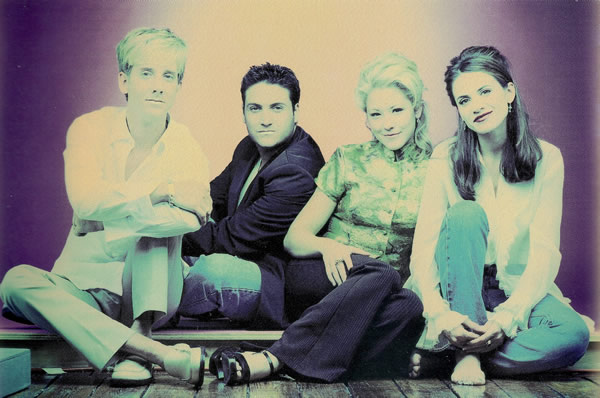
a&e features
Tello Films: Celebrating 19 years of lesbian storytelling
Tello Films proves that, after 19 years, independent lesbian filmmaking is as necessary as ever.
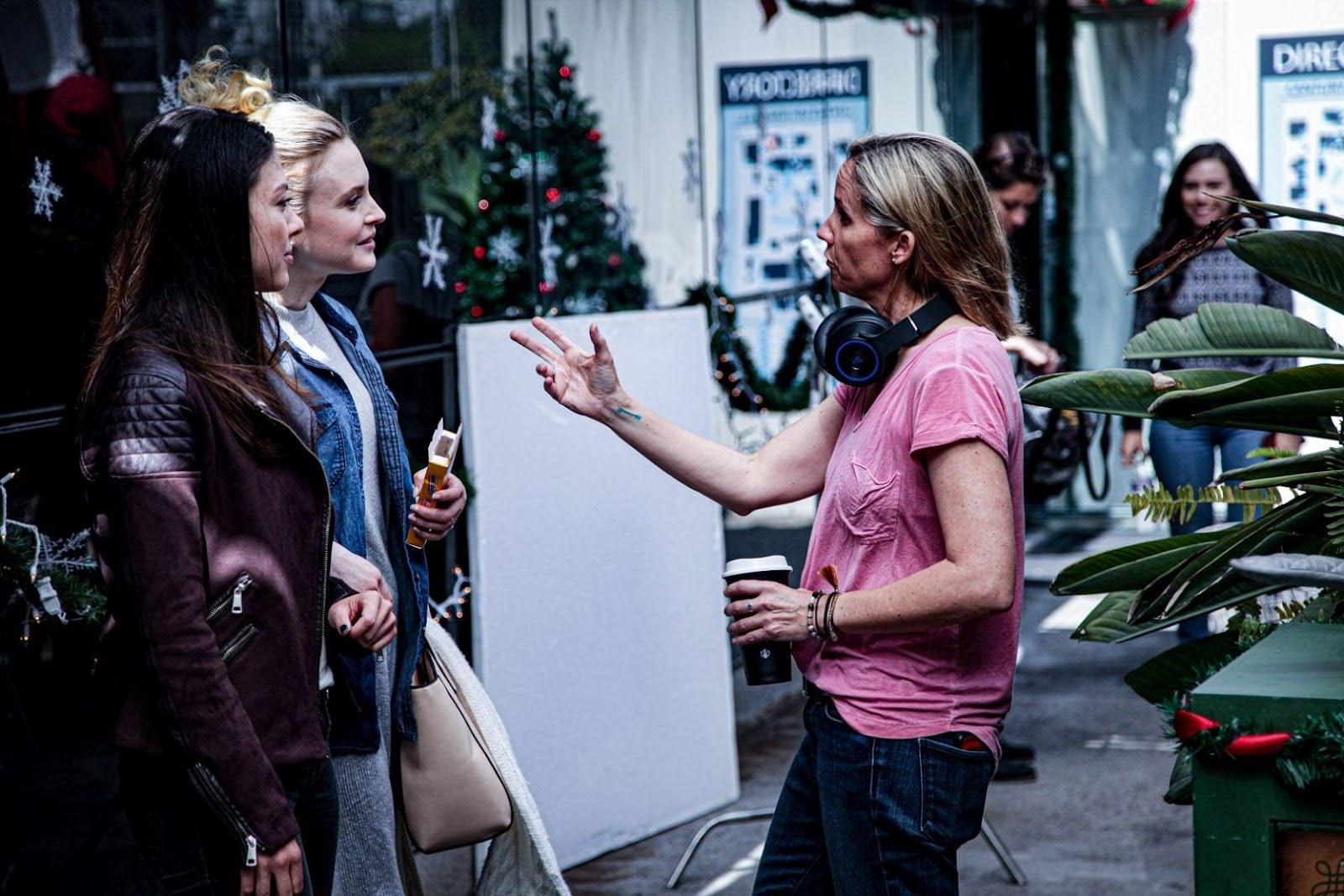
In an era where LGBTQ representation in movies has hit a three-year low, Tello Films proves that, after 19 years, independent lesbian filmmaking is as necessary as ever. According to Sarah Kate Ellis, the CEO and President of GLAAD, “Nearly ⅓ of non-LGBTQ Americans say that LGBTQ inclusive films have changed their perception of our community… It is imperative that networks and streamers do not back down.”
Meanwhile, the lesbian streaming service Tello Films celebrated its 19th birthday on February 6th. Says founder Christin Baker, “When I started it 19 years ago, I thought at some point maybe we wouldn’t be necessary, […] I really do feel like representation saves lives…it’s still important for us to be around.” Often referred to as the “Lesbian Netflix”, the Nashville-based production company has a primary focus on lesbian and sapphic stories for the past 19 years and thankfully, is just getting started.
Tello Films was far ahead of its time. For those of you who didn’t live through or don’t remember, 2007 was a different time. Apple debuted the first iPhone, Barack Obama declared his run for the presidency, and the phrase “that’s so gay!” was prevalent as ever (at least at my high school). “We didn’t have marriage equality at that time. Civil unions were kind of starting here and there -the crazy thing (is that) ‘Don’t Ask Don’t Tell’ was still in effect.” Baker recalls, “There were still so many rights we didn’t have in 2007 when we started it, and we are still fighting for it.”
Tello Films’ beginnings were just the start of the lesbian legacy. Said Christin, “I never thought Tello would or could ever be my full-time job.” With the URL TelloFilms.com registered on February 6, 2007, the platform was an internet-based streaming company with all its movies formatted small to appease a 2007-era browser. While Netflix was only just beginning to offer streaming services, launching any streaming service in 2007 was bold; to launch a streaming service entirely devoted to lesbian and sapphic stories was revolutionary. “I want to make lesbian stories.. I want to see things that represent me.”
In the past 19 years, Baker shares her career-defining moment came from the recently deceased Nancylee Myatt, showrunner for South of Nowhere. “We made a short-form series called Cowgirl Up. I felt like I put my big girl pants on. Nancylee was a huge mentor, and I was like, ‘Oh, I can do this. I can do this, and I can figure it out.’”
Tello went on to receive their first primetime Emmy nomination with Mindy Sterling of Austin Powers fame for Outstanding Actress in a Short Form Comedy or Drama Series. “We got two daytime Emmy nominations for two actresses, Liz Vassey and Carolyn Radere […], then in 2018 we made our first lesbian Christmas movie,, Season of Love and that really kind of started us down the path, and I think we’re probably most well known for, which is our lesbian holiday rom-coms.”
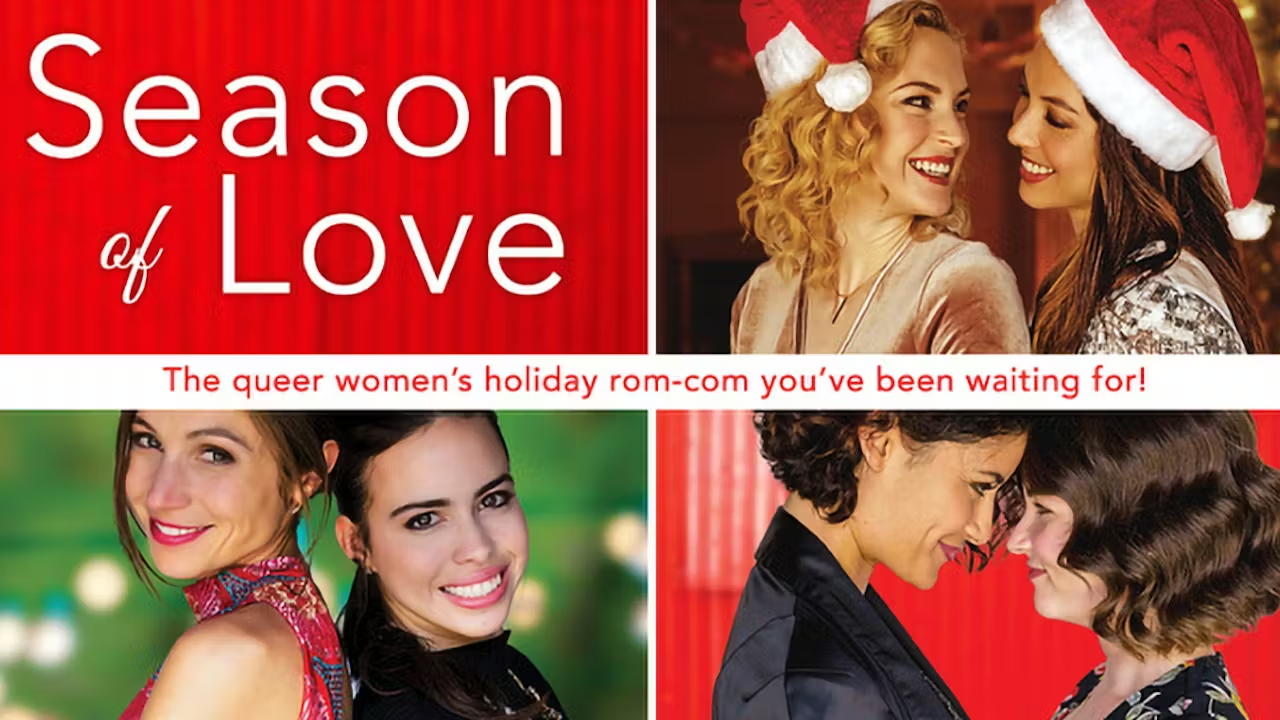
We now live in the era of Chappell Roan, Doechii, Heated Rivalry, and so many more queer artists and pieces of media in the mainstream’s consciousness. The last several years in pop culture have proven that queer art and artists matter, not just as a salve to a society that still struggles to accept us, but to the mass audiences who continue to resonate with it.
Queer media is being devoured by folks outside of the LGBTQ community. “I think it (Heated Rivalry) shocked so many people (because) it was powerful and compelling […] I wasn’t that surprised because I remember Brokeback Mountain being very much in that same vein; it was just cowboys instead of hockey players.” Authenticity and overcoming adversity are not just tenets of good storytelling; they are also ever-present themes within the lives of any queer you know.
As Christin sees it, the success of Heated Rivalry isn’t just rooted in its unabashed sexual themes, it has a very universal “lesbian” approach to its storytelling “There’s a ton of longing, and missing, and having a crush and not knowing if it’s reciprocated, […] there’s a lot that you tap into just on a human level that Heated Rivalry really touched on.”
Themes that are at the forefront of the sapphic stories Tello has mastered telling. “We still don’t have enough LGBTQ holiday Christmas movies out there each year. Some people wouldn’t look at a Hallmark movie or Christmas rom-com as substantive, but I really do feel like representation saves lives.”
For so many in the LGBTQ community, representation isn’t theoretical- it’s personal. I know for myself, in the throes of a messy divorce, one of the only things that brought me comfort was the sapphic films on Tello. It was so difficult to find lighthearted queer stories. I recall searching through every streaming service as they were slowly but surely eliminating the LGBTQ sections from their apps, as well as those queer characters and shows. But not Tello; I was able to find comfort and ease through a tough time in my personal life. “It’s such comfort, especially if you’ve gone through something that’s tough and your regular daily life is stressful, you need an escape to something that you know is not going to cause more anxiety.”
Having accessible ways to both tell and consume sapphic stories is tantamount to this moment in time. Independent filmmaking has the power to make sure authentic stories are heard. Being an independent voice as well as being able to support smaller budget stories that definitely wouldn’t get picked up, or even recognized or seen in mainstream, Christin and Tello Films are uplifting not just lesbian and sapphic stories, but lesbian and sapphic artists as well.
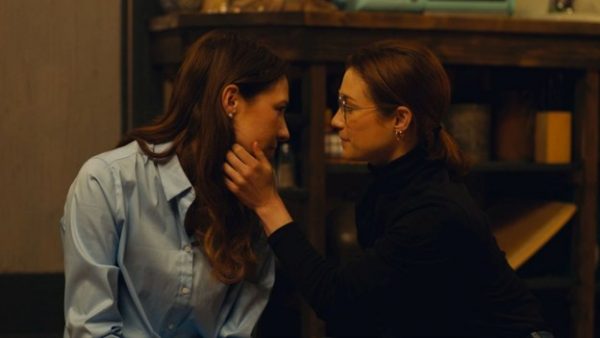
As for the future of lesbian filmmaking, it’s no secret that Hollywood is drowning, leaving a void for people like Christin and Tello Films to fill. Said Baker in light of the shrinkage in Hollywood and what that means for Tello Films, “We will get even more creative and tell even more stories, because we can’t be stopped.”
Encouraged by her fiancée, Stacey Lee Powell, Christin wants the world to know that Tello Films isn’t just a business, it’s personal. “I see Tello as an extension of me.” Says Baker, “In doing that, I hope that people see that Tello isn’t some corporate entity, I hope they see that it is someone who cares deeply. I’ve been doing this for 19 years, and every day I wake up trying to figure out how to tell our stories and how to serve our community.” Nineteen years later, Tello Films remains what it has always been: not a nameless, faceless corporation, but an extension of a storyteller’s dream to build a safe space for her community.
Check out TelloFilms.com
a&e features
From ‘So Random’ to sexy theater: LA’s very own Mathew Scott Montgomery
This former Disney star breaks down their new play, ‘Foursome,’ and the security of performance.
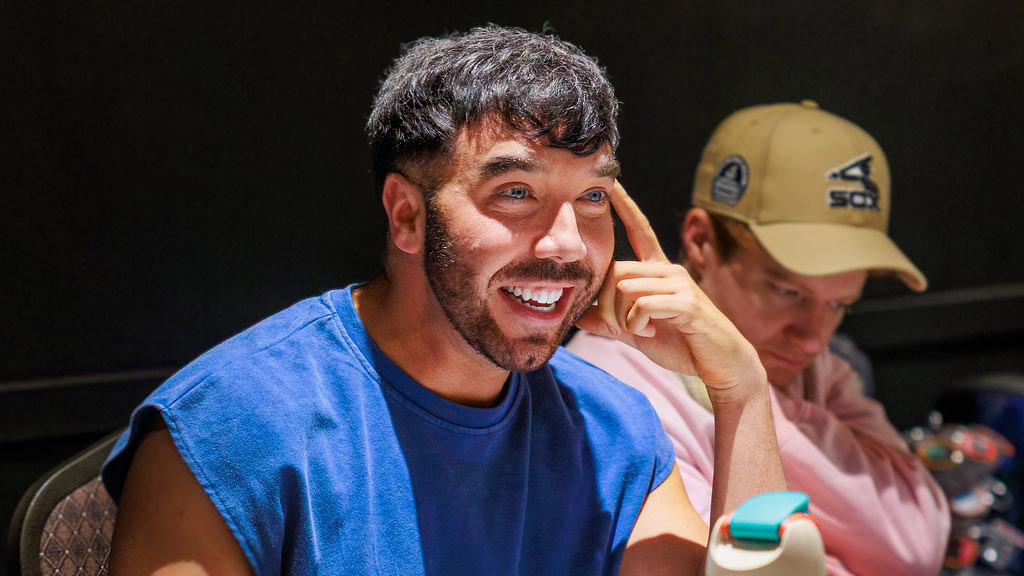
Even in a Los Angeles filled with experimental theater, few projects have been as brazenly sexual as the IAMA and Celebration’s Foursome. Following a quartet of queer friends as they embark on a weekend getaway, this play watches as they uncover the secrets (and attractions) that have always lurked in the shadows of their longtime friendships. Filled with niche community references, heartfelt vulnerability, and some of the spiciest live sex scenes audiences will ever see, Foursome is proving itself as an innovative look into queer sexuality — and none of it would have been possible without The Disney Channel.
Matthew Scott Montgomery began his career on Disney with one goal: pull focus. He quickly found out that he was a tad too good at this; in his conversation with the LA Blade, he detailed the many times his early onscreen performances were cut down because he was considered ‘too distracting.’ From starring as an extra in Zendaya’s Shake It Up to leading the SNL-style So Random!, his childhood career saw Montgomery flexing the bombastic personality he still carries today. And while the goal of this interview was to speak with the performer about Foursome and his time with Disney, the first few minutes were spent discussing an equally important portion of the man’s life: the Hilary Duff concert he’d seen at The Wiltern the night before.
“[I’d] spent all day in rehearsals with three of the best queer actors in the world, and [then I left] to go to a Hilary Duff concert in LA with my boyfriend, as a gift from [Demi Lovato],” raved Matthew. “I burst into tears because it hit me: none of this would’ve happened if I hadn’t come out…I wish I could go back to ten-year-old me back in North Carolina and [tell him], ‘One day, you’re going to leave your gay play rehearsal, [meet up] with your boyfriend, and go to a Hilary Duff concert. And everything is going to be okay.”
Matthew remembered this little kid from a conservative hometown who dreamt of nothing more than boyfriends and Lizzie Maguire in concert. He explained that his area of North Carolina didn’t allow for any level of dramatics from young boys — something that definitely didn’t mesh with this gay child who felt safest when he was onstage.
“When I was a kid, I used to record episodes of Will and Grace [on the VCR], write down the dialogue, then go into my room and run the scenes [when everyone was asleep]…I’ve always identified as an artist, and I was desperate to perform,” said Matthew, reminiscing on his early days as an artist. “I think the safest place in the world is on stage or in front of a camera, because you know exactly what you’re going to say. You know what your lines are, which mark you’re gonna hit…everyone is watching you, and you’re being perceived, and it feels so safe. I get nervous off camera, because then you don’t have a map of what’s happening.”
Performance has always served as both a passion and a safety for the actor, with Montgomery laughing at the many years he spent acting out his favorite shows in the sanctity of his childhood bedroom. Luckily, he eventually took these skills to a giant stage most kids could only dream of: The Disney Channel.
After years of hearing the terrible experiences of so many child actors, it’s heartening to learn how validating Montgomery’s early time on TV was. He told stories of Disney gigs and fun hangouts with queer stars like Haley Kiyoko and Demi Lovato, people who he still considers close friends today. “We would talk about our queerness and how to navigate it,” he said, showing love to the tight-knit network that these closeted children created for one another. It was because of their support that he had the courage to come out in his early 20s, with this new self-acceptance allowing Matthew to take on openly queer projects and even begin writing his own — cue Foursome, his latest creation and certainly the sexiest one yet.
Foursome sees the actor as Noah, a young man whose weekend at a cabin with three friends turns into a night of revelry as loosened inhibitions lead to shocking confessions. On why he created a project centered on modern sexuality, he explained, “I think there’s a really beautiful thing about the queer community where we can love each other through different evolutions of our friendships…this play is really about celebrating that freeness, and having a very frank discussion about what it means to be a queer person in a relationship in the modern day.”
The project douses this exploration into contemporary sexuality with so much pop symbolism that it’ll be relatable for any LGBTQ+ person watching. From the pop songs our main cast sing to the community-based slang they throw at one another, the writer wanted to instantly clue queer watchers into the fact that this was made for them by one of their own. And it’s that, he stressed, that is the goal of not only Foursome, but his entire career: making other people feel seen.
“What’s most important to me is queer joy,” Matthew stated, as the conversation came to an end. “Showing queer people having a good time…I think that can be a radical thing, especially with the way the world is right now. We’re going to be gay, and we’re going to be fun, and [our goal] is to have you join us in that fun.” He promises that Foursome will be a summation of his decades-long career of making people laugh, combining his uniquely gut-busting brand of humor with an earnest discussion around how our communities form relationships outside of heteronormative ideals. He invites everyone to come see Foursome and, in its nonstop joy, hopes that by creating this kind of inclusive art piece for viewers, he’ll be imparting onto them some of the security he’s always felt onstage.
And when asked if he had any final enticements for potential watchers, Montgomery adorned the smile that he’s worn since his Disney days and stated, “Well, we do say that the title, Foursome, is a promise — and we absolutely deliver.”
Foursome will have its world premiere with IAMA Theatre Company, produced in association with Celebration Theatre. Performances are at the Atwater Village Theatre, 3269 Casitas Avenue, Los Angeles, and plays now through March 23. Tickets ($30-$45) are available at iamatheatre.com
a&e features
Angel McCoughtry, “Renaissance Woman”
Angel McCoughtry is a professional athlete. A two-time gold medalist, 5-time WNBA all-star, philanthropist, and now filmmaker.

“Renaissance Woman” is a term fit for a queen. Heavy is the head that wears the crown, but we’re in luck because Angel McCoughtry is a professional athlete. A two-time gold medalist, 5-time WNBA all-star, philanthropist, and now filmmaker, Angel has built career(s) defined by reinvention and an insistence on excellence at every turn.
Her move to take charge behind the camera comes at a time that feels anything but divine. In a time where stories like Heated Rivalry bring the heat (pun intended) one moment, while nearly half of all queer characters and stories are vanishing from TV the next, McCoughtry’s leadership behind the camera signals something hopeful: A refusal to let anyone or any story get left behind.
A WNBA legend, McCoughtry played ten years without pause, splitting her time between the W and overseas leagues. In college, she led the Big East Conference in scoring, rebounds, and steals, obliterating records, even the ones she herself set. The number one draft pick and Rookie of the year in ‘09, McCoughtry quickly became one of the best players the W has ever seen. Though she never officially retired, Angel hasn’t played in the W since 2022, when she was sidelined for an injury that she has since healed. (Ya hear that WNBA? Our girl is ready to come back!)
Being forced to step away from the game brought about a reckoning that is all too familiar to elite athletes everywhere: “Who are you when your body won’t let you perform?” Through detangling this identity crisis, McCoughtry found a new appreciation for storytelling, the stories we tell ourselves as well as the stories we tell the world. Angel’s innovative storytelling and directing style are inspired by basketball, as she likens herself to the Dawn Staley of film, adding, “When you allow your players to be free, they can play at their highest level, and that’s what I allow my actors to do.”
Inspired by her grandmother’s stories of playing ball in a time when women were not allowed to cross half court and had to wear skirts, Angel wants to empower resilient perspectives. “I can’t keep their stories hidden,” She says, “The women who paved the way.” Laser focused on bringing scripted sports films to the mainstream, McCoughtry says, “I’m looking for stories that resonate with the people, and I want to be the one to bridge the gap and bring women’s sports scripted content to the forefront.”
Through McCoughtry Entertainment, Angel wants to bring women’s sports to the forefront as well as genre-driven films, particularly sports-thrillers led by women. Her short film Bygones is now available to stream on Prime Video, with more projects in the barrel. Her feature-length directorial debut, Bolted, is on deck as her next project. I personally would love to see the gay women’s version of Heated Rivalry in McCoughtry’s hands, who says, “There’s a realness to it,” about the show, “That happens often, and it’s not talked about [..] that’s all over women’s sports.”
“I am obsessed with stories about overcoming adversity,” says McCoughtry, an apt throughline in Angel’s work that reflects the spirit of creativity and athleticism.
a&e features
Alexander Skarsgård describes ‘Pillion’ in 3 words: lube, sweat, leather
Highly anticipated film a refreshingly loving look at Dom-sub life
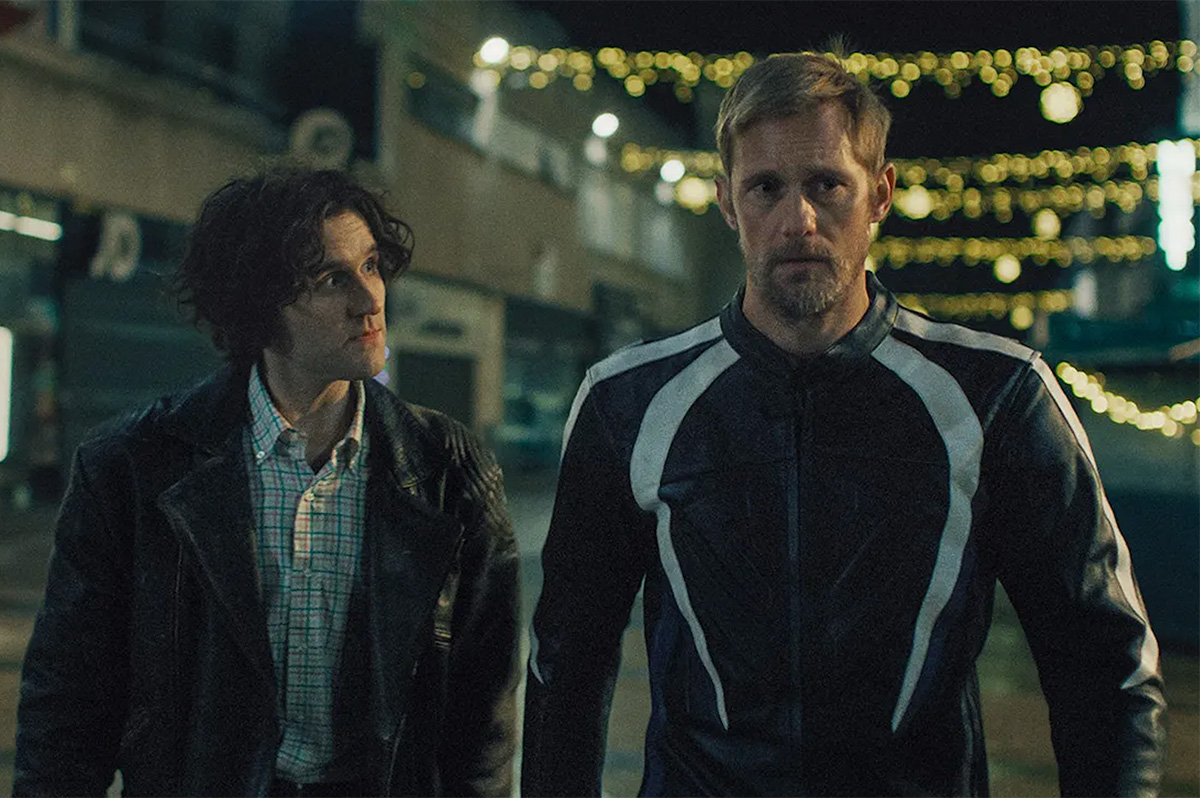
Whether you’ve seen him in popular HBO series like “True Blood,” “Succession,” and “Big Little Lies,” the dynamic Swedish actor Alexander Skarsgård has that smoldering gaze that immediately draws viewers in.
Following in the footsteps of his father Stellan, (who just won the Golden Globe for “Sentimental Value”) the Golden Globe, Emmy, and SAG winner Skarsgård continues to be an actor who is fearless in the roles he takes on.
That courageousness is evident in Skarsgård’s latest film, the BDSM black comedy “Pillion,”which he also executive produces. He plays Ray, the handsome, hyper-dominant leader of a gay bike gang. The film was written and directed by Harry Lighton, and is based on the 2020 novel “Box Hill,” by Adam Mars-Jones.
“This was a small film by a first time filmmaker and it wasn’t financed when I read it,” Skarsgård told journalists at a recent awards news conference. “And I felt that, if I could help in any small way of getting it financed, I wanted to, because I thought it was such an incredible screenplay and I believe in Harry Lighton so much as a filmmaker. And it felt tonally unlike anything I’d ever read. It was such an exciting, surprising read.”
Skarsgård was blown away by the quality of the unconventional script. “When I heard BDSM relationship, biker culture, I expected something very different. I didn’t expect it to have so much sweetness and tenderness and awkwardness.”
For the sex scenes and nudity with co-star, Harry Melling — who excels in his portrayal as Ray’s submissive Colin — Skarsgård talked very early on with Lighton about how he wanted to shoot those scenes, and why they were in the film.
“I often find sex scenes quite boring in movies because a lot of the tension is in the drama leading up to two people hooking up, or several people hooking up, as in our movie. But what I really enjoyed about these scenes — they are all pivotal moments in Colin’s journey and his development. It’s the first time he gets a blowjob. It’s the first time he has sex. It’s the first time he has an orgasm. And these are pivotal moments for him, so they mean a lot. And that made those scenes impactful and important.”
Skarsgård was happy that Lighton’s script didn’t have gratuitous scenes that shock for the sake of just shocking. “I really appreciated that because I find that when this subculture is portrayed, it’s often dangerous and crazy and wild and something like transgressive.”
He continued: “I really love that Harry wanted it to feel real. It can be sexy and intense, but also quite loving and sweet. And you can have an orgy in the woods, rub up against a Sunday roast with the family. And that kind of feels real.”
One of the obstacles Skarsgård had to work with was Ray’s emotionally distant personality.
“Ray is so enigmatic throughout the film and you obviously never find out anything about him, his past. He doesn’t reveal much. He doesn’t expose himself. And that was a challenge to try to make the character interesting, because that could easily feel quite flat…That was something that I thought quite a lot about in pre production…there are no big dramatic shifts in his arc.”
For the film, Lighton consulted the GMBCC, the UK’s largest LGBT+ biker club, attending their annual meetup at which 80 riders were present.
“Working with these guys was extraordinary and it brought so much texture and richness to the film to have them present,” said Skarsgård. “They were incredibly sweet and guiding with us — I can’t imagine making this movie without them. I’d go on a road trip with them anytime.”
Added Skarsgård: “To sum up ‘Pillion’ in three words: lube, sweat, and leather. I hope people will connect with Colin and his journey, and come to understand the nuance and complexity of his bond with Ray.”
This year is shaping up to be a busy one for Skarsgård. “Pillion” premieres in select cities on Feb. 6 and then moves into wide release on Feb. 20. After that for Skarsgård is a role in queer ally Charli XCX’s mockumentary, “The Moment,” which premieres at the Sundance Film Festival. HIs sci-fi comedy series, Apple TV’s “Murderbot,” which he also executive produces, will begin filming its second season. And this weekend, he hosts “Saturday Night Live.”
a&e features
“I just kept showing up”: Broadway veteran Marc Shaiman reflects on musical success stories
In his new memoir, Marc Shaiman reflects on his dream job composing music for ‘Mary Poppins Returns’ and the “nightmare” experience that was working on the show ‘Smash’
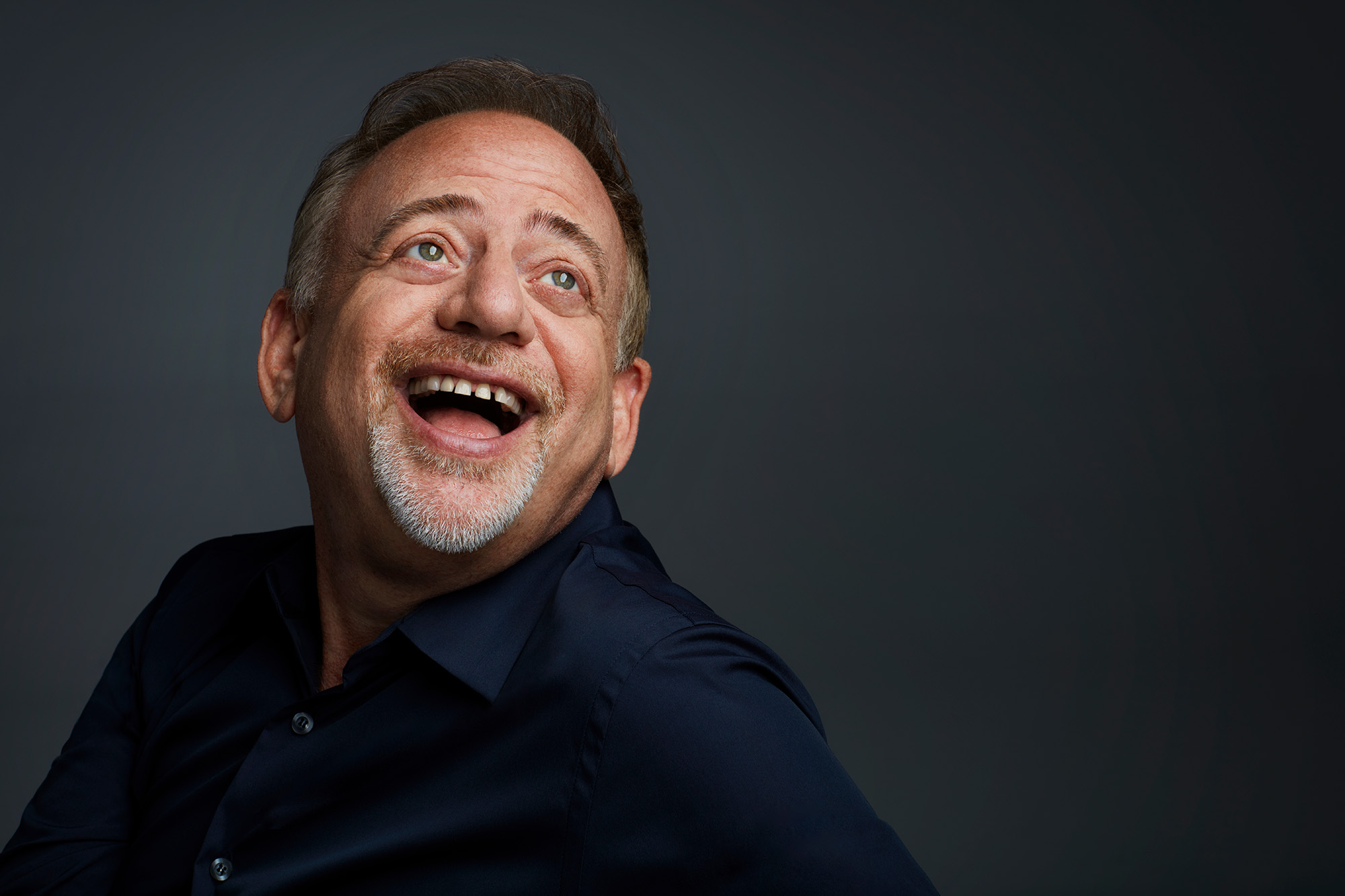
If you haven’t heard the name Marc Shaiman, you’ve most likely heard his music or lyrics in one of your favorite Broadway shows or movies released in the past 50 years. From composing the Broadway scores for Hairspray and Catch Me if You Can to most recently working on Only Murders in the Building, Hocus Focus 2, and Mary Poppins Returns, the openly queer artist has had a versatile career — one that keeps him just an Oscar away from EGOT status.
The one thing the award-winning composer, lyricist, and writer credits with launching his successful career? Showing up, time and time again. Eventually, he lucked out in finding himself at the right place at the right time, meeting industry figures like Rob Reiner, Billy Crystal, and Bette Midler, who were immediately impressed with his musical instincts on the piano.
“Put my picture under the dictionary definition for being in the right place at the right time,” Shaiman says. “What I often try to say to students is, ‘Show up. Say yes to everything.’ Because you never know who is in the back of the theater that you had no idea was going to be there. Or even when you audition and don’t get the part. My book is an endless example of dreams coming true, and a lot of these came true just because I showed up. I raised my hand. I had the chutzpah!”
Recalling one example from his memoir, titled Never Mind the Happy: Showbiz Stories from a Sore Winner ( just hit bookshelves on January 27th), Shaiman says he heard Midler was only hiring Los Angeles-based artists for her world tour. At the young age of 20, the New York-based Shaiman took a chance and bought the cheapest flight he could find from JFK. Once landing in L.A., he called up Midler and simply asked: “Where’s rehearsal?”
“Would I do that nowadays? I don’t know,” Shaiman admits. “But when you’re young and you’re fearless … I was just obsessed, I guess you could say. Maybe I was a stalker! Luckily, I was a stalker who had the goods to be able to co-create with her and live up to my wanting to be around.”
On the occasion of Never Mind the Happy’s official release, The Blade had the opportunity to chat with Shaiman about his decades-spanning career. He recalls the sexual freedom of his community theater days, the first time he heard someone gleefully yell profanities during a late screening of The Rocky Horror Picture Show, and why the late Rob Reiner was instrumental to both his career and his lasting marriage to Louis Mirabal. This interview has been edited and condensed.
Naturally, a good place to start would be your book, Never Mind the Happy. What prompted you to want to tell the story of your life at this point in your career?
I had a couple of years where, if there was an anniversary of a movie or a Broadway show I co- created, I’d write about it online. People were always saying to me, “Oh my God, you should write a book!” But I see them say that to everybody. Someone says, “Oh, today my kitten knocked over the tea kettle -” “You should write a book with these hysterical stories.” So I just took it with a grain of salt when people would say that to me. But then I was listening to Julia Louis-Dreyfus’ podcast, and Jane Fonda was on talking about her memoir — not that I’m comparing myself to a career like Jane Fonda’s — but she felt it was time to take a life review. That really stuck in my head. At the time, I was sulking or moping about something that had not gone as well as I wished. And I guess I kind of thought, “Let me look back at all these things that I have done.” Because I have done a lot. I’m just weeks short of my 50th year in show business, despite how youthful I look! I just sat down and started writing before anyone asked, as far as an actual publisher.
I started writing as a way to try to remind myself of the joyous, wonderful things that have happened, and for me not to always be so caught up on what didn’t go right. I’ve been telling some of these stories over the years, and it was really fun to sit down and not just be at a dinner party telling a story. There’s something about the written word and really figuring out the best way to tell the story and how to get across a certain person’s voice. I really enjoyed the writing. It was the editing that was the hard part!
You recall experiences that made you fall in love with the world of theater and music, from the days you would skip class to go see a show or work in regional productions. What was it like returning to those early memories?
Wonderful. My few years of doing community theater included productions that were all kids, and many productions with adults, where I was this freaky little 12-year-old who could play show business piano beyond my years. It was just bizarre! Every time a director would introduce me to another cast of adults, they’d be like, “Are you kidding?” I’d go to the piano, and I would sightread the overture to Funny Girl, and everybody said, “Oh, OK!” Those were just joyous, wonderful years, making the kind of friends that are literally still my friends. You’re discovering musical theatre, you’re discovering new friends who have the same likes and dreams, and discovering sex. Oh my god! I lost my virginity at the opening night of Jesus Christ Superstar, so I’m all for community theater!
What do you recall from your early experiences watching Broadway shows? Did that open everything up for you?
I don’t remember seeing Fiddler on the Roof when I was a kid, but I remember being really enthralled with this one woman’s picture in the souvenir folio — the smile on her face as she’s looking up in the pictures or looking to her father for approval. I always remember zooming in on her and being fascinated by this woman’s face: turns out it was Bette Midler. So my love for Bette Midler began even before I heard her solo records.
Pippin and The Wiz were the first Broadway musicals I saw as a young teenager who had started working in community theater and really wanted to be a part of it. I still remember Pippin with Ben Vereen and all those hands. At the time, I thought getting a seat in the front row was really cool — I’ve learned since that it only hurts your neck, but I remember sitting in the front row at The Wiz as Stephanie Mills sang Home. Oh my god, I can still see it right now. And then I saw Bette Midler in concert, finally, after idolizing her and being a crazed fan who did nothing but listen to her records, dreaming that someday I’d get to play for her. And it all came true even before I turned 18 years old. I just happened to be in the right place at the right time, and met one of her backup singers and became their musical director. I was brought to a Bette Midler rehearsal. I still hadn’t even turned 18, she heard me play and said, “Stick around.” And I’ve stuck around close to 55 years! She’s going to interview me in L.A. at the Academy Museum. Would I have ever thought that Bette Midler would say yes to sitting with me, interviewing me about my life and career?
That’s amazing. Has she had a chance to read the book yet?
She read it. We just talked yesterday, and she wants to ask the right questions at the event. And she even said to me, “Marc, I wasn’t even aware of all that you’ve done.” We’ve been great friends for all these years, but sometimes months or almost years go by where you’re not completely in touch.
In the book, you describe moving between New York and Los Angeles, especially when you started working more in film. As a queer artist, what was your experience finding LGBTQ+ community between the two coasts?
As far as gayness, they’re equally gay! I guess New York tilts a little more. I came to New York in 1976, so during the ‘70s in New York, anything goes! That was the height of sexual freedom and expression, then the ‘80s brought the hideousness of AIDS. For a long time, part of being gay was the endless death that I was surrounded by — losing just about every friend and colleague. My god, when I first started living in L.A., coming out there to work with Bette in the ‘80s, almost every single person I met died by the mid ‘90s. Everyone, everyone was gone. That was unfortunately a huge part of my life, and anyone my age can relate to that. God bless everyone not my age that will hopefully never ever have to experience anything close to the devastation of a funeral every week. Even to say it now, it’s hard to imagine or believe that happened.
But you know, I’m in show business, so there are gay people everywhere and happily so. I’m lucky that I grew up without any kind of shame about that, or a feeling that I needed to hide it. Although I didn’t come out to my parents. It wasn’t until I finally told my mom one day that I had been to yet another funeral, as I was sharing with her about AIDS. That was when she finally said, “Scott is more than your roommate, isn’t he?” And I was like, “Yes.” Why did I pretend? I never pretended anywhere else, and I never pretended about anything else. But I still grew up in a time when – well, I mean, I’m not naive, I know it’s still a time now where a lot of people can’t come out to their family or parents — but I certainly came out a time long before there were people coming out on TikTok for the whole world to see. It was a bit more of a private thing, but I was always happily gay. And dare I say, as I even say in the book, when my libido took off at around 15, and all the other 15 and 16-year-olds were around me, I was the pied piper!
In the spirit of being at the right place at the right time, you almost accidentally became part of The Rocky Horror Show and the immersive, theatrical performances that emerged in those midnight screenings.
We actually started that, which, once again, is hard for me to believe. I went to New York with my friend from community theater, Sal, and we walked by the Waverly Theatre. He said, “Oh, I heard that this movie just opened, I hear it’s really outrageous.” We got in line and really hit it off with these other guys and gals. We went to see it and loved it and said, “Let’s come back tomorrow night!” These strangers that we just met came back too. When Susan Sarandon (who played Janet) holds a newspaper over her head in the rain, Louis Farese is the first person to yell out anything. He yelled, “Buy an umbrella, you cheap bitch!” The audience exploded in laughter. Sal and I were big hams and were like, “We’ve gotta get a laugh. We’ve got to figure out something to say and get a laugh like this!”
You started working in film through your collaborations with director Rob Reiner, who recently passed. What was it like stepping into scoring and making that leap with films like Misery and When Harry Met Sally…?
I was lucky enough, by Billy Crystal introducing me to Rob Reiner, to get the job doing the music for When Harry Met Sally…. But that was arranging existing songs, arranging and orchestrating with Rob. I worked on Beaches (starring Bette Midler) at the same time, and that was the same thing — arranging songs, orchestrating them, co-producing the recordings. Suddenly, I had these two hugely successful soundtrack records I had co-produced, but I had never written a film score or done a student film. Since I was a kid, I had a little theme for when my cat walked across the room. If somebody walked into the room at a party, I would play something funny as they walked in.
Rob had an inkling and called me, “Hey buddy, you want to score my next movie, Misery, a psychological thriller?” I was wondering why he thought I could do that. I had just gotten an agent as I moved to L.A., and even my agent said to Rob, “What makes you think Marc can write a film score?” Rob simply said, “Talent is talent.” That became my agent’s mantra as he got me one job after another, and Rob’s faith in me was just an overwhelming, life-changing thing. He became so important to me, and someone I’ll be thankful for as a colleague and even more so as a friend. For the rest of my life, I’ll be thanking him for that.
He was a true advocate for the LGBTQ+ community, fighting against California’s Proposition 8 same-sex marriage ban by co-founding the American Foundation for Equal Rights in 2009.
Very likely, I wouldn’t be married if it weren’t for Rob and Michelle Reiner. They were intensely a part of the fight to get to the Supreme Court. They were a part of that in all ways — financially, fighting, and showing up vocally. So, besides everything else, I’m the most happily married man on the face of the earth. And I can thank Rob and Michelle for that.
That’s beautiful. As we look back on your career, you’ve worked on everything from Broadway musicals like Hairspray to more recent revivals/sequels like Mary Poppins Returns, which you describe in your book as your dream job. What do you make of how the landscape for these filmed musical adaptations has evolved? It seems like studios are now more apprehensive about promoting them as actual musicals.
Isn’t it crazy? Even after Wicked making billions of dollars, I bet with the next movie musical, they’ll still pretend like it’s not a musical. Even Wicked had commercials where they didn’t sing! It’s so schizophrenic. There’s clearly an audience for them and yet the studios are so afraid. I don’t know. Can you explain it?
I don’t know if I can.
I mean, Mamma Mia! Hairspray the movie was very successful, but did they show singing for the commercials for Hairspray? I don’t remember, but I don’t think they did.
In the book, you mention Cole Escola and other queer artists who are doing exciting things today. Are there any particular actors or recent films and shows that you’ve been impressed by?
Well, god knows Heated Rivalry. My god, what’s going on with that? It’s just so fantastic watching these videos of the straight podcasters crying at episode five. Of course, I watched it for the sexiness of it all, but then I got caught up in it. I cried my fucking eyes out at that episode when he calls his lover down to the rink. I was just like those guys watching those reaction videos.
It shows how schizophrenic this world is. There are so many mean people full of hatred, yet there are also many people full of love who are open to a show like that. It’s phenomenal. I don’t know what’s going to become of this world, but I’m happy I got to live the life I’ve gotten to live. I hope we’re not entering a world where our worst fears are all coming true. This may sound superficial, but even something like Heated Rivalry — I don’t think that’s superficial. It shows there are large numbers of people who get it.
How do you feel as you’re getting ready to share this book and your stories with the world?
It’s not just about me tooting my own horn, though I’d be a hypocrite to say that I’m not to a certain level. It’s also about showing people — if you want to do something, just go out and fucking do it. Just keep at it. I wanted to quit a million times but I didn’t, and just like people told me, something did happen because I just kept showing up.
Never Mind the Happy: Showbiz Stories from a Sore Winner is now available wherever books are sold
a&e features
Everyone should be a little more like Van Goth
The winner of Canada’s Drag Race season 6 breaks down her historic win and why you should embrace the shade.
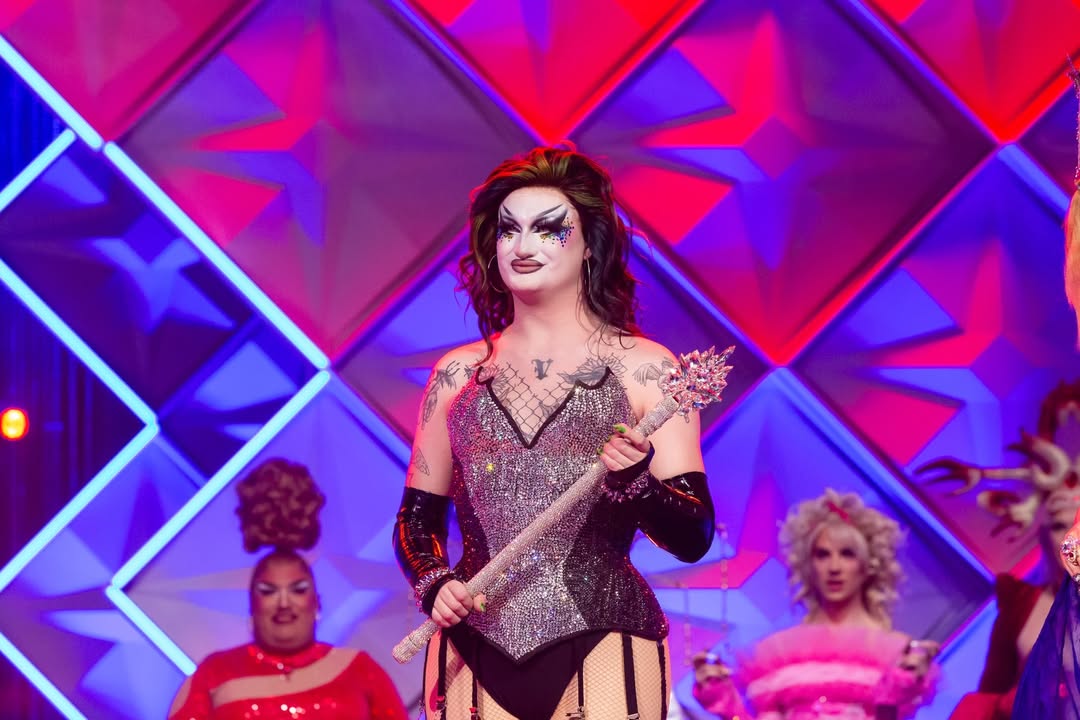
Canada’s Drag Race fans rejoice: a new Queen of the North has officially been inducted into the hall of fame! After one of its wildest seasons ever, RuPaul’s Drag Race’s Canadian spinoff has officially named Van Goth, Toronto’s resident punk rock princess, as ‘Canada’s Next Drag Superstar’.
While every winner has a unique path to the crown, Van’s was a tad more chaotic than most. The performer not only made history by winning four challenges — more than anyone else in the show’s history — but was called out multiple times for alleged backstabbing and shady behavior. Yet despite these call-outs, this Queen soldiered on, using every moment onscreen to say exactly what she was thinking and eventually fight her way to the series’ $100,000 grand prize.
Canada’s newest winner spoke with the Los Angeles Blade about what it means to win one of television’s biggest awards today. Digging into her many iconic moments on the show, Van Goth spoke about how proud she was to showcase her art and why she doesn’t regret any of her ‘shady’ moments — and why queer artists everywhere could benefit from being a little more shady themselves!
“Going onto RuPaul’s Drag Race, you need a goal to hold onto,” said Van Goth, when discussing the mindset that got her to Canada’s Drag Race finale. “Winning is a bad goal — because most people lose Drag Race. That’s just the tea! My goal was that when I left [the show], you could not think about season six or the best to ever do it without [thinking of] me. And I accomplished that even before I got the crown.” It would be hard for anyone to disagree; Goth instantly caught viewers’ attention with the punk style she brought to the show’s mainstage. A mixture of riot aesthetics and classic elegance — her name is an homage to Van Gogh, after all — every turn on the runway brought a new, jaw-dropping look for viewers to fall in love with. And not only were the outfits immaculate to look at, but many held a purpose, with Van using some of her outfits and performances to bring attention to those living with HIV (she herself is undetectable).
Her advocacy and outfits were enough to grab viewers’ attention, but those weren’t the only reasons fans quickly grew intrigued by Van Goth. When she wasn’t securing wins and turning looks, the performer just couldn’t seem to stop causing drama behind the scenes.
“I didn’t make the rules for the competition. They were laid out for me, and I used them,” clarified Goth, when discussing how she’s been labelled a ‘backstabber.’ The moniker comes from the prevalence of alliances that appeared on this season, with Van breaking a majority of the ones she was a part of. With Canada’s Drag Race featuring a unique rule that allows winning queens to save bottom queens from elimination (the illustrious ‘golden beaver’), Goth had promised multiple people that, if given the chance, she’d spare them from elimination. But despite these promises, Van always knew she’d only make decisions that helped her get to the win.
“I came from a competitive sports background — I played rugby for 12 years!” She explained. “So, it was easy to tap back into that [cutthroat] mindset for this competition.” A cutthroat mindset that earned her ire from many other queens, with Sam Star publicly calling out Van Goth and claiming it was because of her betrayal that her Drag Race dreams were ruined. Goth assured that she has a great relationship now with Star and every other queen on this installment. But when asked whether she regrets any of these choices, the winner clarified, “Something that I love about my run on the show was that I was really honest, but I also was really firm in my position.”
“If someone came at me and said something that I didn’t agree with, I pushed back on it. And I really hope that artists around the world see that and know that they have a voice and it’s powerful, and they can use it.” Van Goth encourages people to see the deeper meanings of the ‘dramatic’ scenes she had on the show, to recognize them as moments where a queer person refused to stay silent and always went after what was best for them. She continued, “[If you] don’t agree with something, [you] should speak out and stand up for it! There’s so much power in what you say…[and] I feel like moving forward as queer artists, especially in this day and age, we have to really stand up for our own and what we do, and push back against the world. And still find a way to create art that gives people hope and entertainment during these dark times.”
As the interview came to an end, Van Goth shared what she hoped people learned from her time on the season. It’s easy (and admittedly enjoyable) to focus on her drama, but the performer’s mission as reigning Queen of the North is to inspire others to act as defiantly confident as she is. “I [plan to] travel, continuing to lift up local communities and continue to give people hope. To inspire artists to live their dreams, and really go for it.”
Van appears content with the knowledge that some people may not care about this goal. That many avid fans will instead focus on her alleged slights, on how she apparently ruined their favorite competitor’s chance at the crown. In regard to that point, especially, Van had one thing to say.
“They should try harder next time…and then, maybe, they would win.”
a&e features
Writing her own story arc: Stuntwoman Ellie Haigh takes on Hollywood
A candid conversation with stuntwoman Ellie Haigh on training arcs, chosen family, and what it means to take up space as a trans woman in Hollywood

If you take a peek back at stuntwoman Ellie Haigh’s pre-career upbringing, you will find a kid geeking out to Power Rangers with an overwhelming sense of possibility. Far before she was doubling actors or choreographing fights, Haigh was already building her training arc through gymnastics, parkour, martial arts, and determination. What started as a childhood appreciation for Ninja Turtles steadily evolved into a career founded on movement with intention.
Moving to Los Angeles in September 2020 (arguably the worst possible moment to set sails for the Hollywood dream), Haigh entered the stunt world with no map, no safety net. As one of – and quite possibly the only – openly trans women working in stunts, Haigh navigated an industry that is both physically exhausting and slow to change. Instead of shrinking herself to fit the mold, Haigh has instead opted for visibility and authenticity. She has quickly learned when to fight, when to teach, and when to simply take space.
In our conversation, Haigh shares on motion, mentorship, and the responsibility of this visibility. She serves on the growing pains of Hollywood and its politics, and why fantasy worlds often tell the truest stories.
What first sparked your enthusiasm and interest in stunt work? Was there a moment when you realized it could be a real career?
I remember as a kid getting into parkour, gymnastics, and martial arts. What sparked that, this is a little embarrassing, was Power Rangers. Watching it as a kid, I remember feeling such intense FOMO. I wanted to be Kimberly, the Pink Ranger, so badly. I used to do everything I could to be her. All my hobbies just ended up relating to that in some way.
I added acting into the mix as well, and it just felt like the right path. I didn’t realize stunt work could actually be a career until I was much older, probably in high school. At that point, all my hobbies were already aligned. After high school, I was coaching gymnastics full-time and realized pretty quickly, this isn’t it. That’s when I decided to move to LA.
Are there skills from coaching gymnastics that translated into stunt work?
Absolutely. I taught gymnastics and parkour for about ten years, mostly to children. There are a lot of aspects of stunts, especially when you’re doubling, where you have to teach actors what you’re doing. Or if you’re part of a stunt team creating choreography or previsualization, you need to be able to explain movement clearly. Coaching made that much easier.
Aside from the Pink Ranger, who were some of your earliest influences?
A lot of them were fictional. Video games, superhero shows, Marvel comics, Spider-Man, Spider-Gwen. Power Rangers, Ninja Turtles. I also loved anime and still do. I remember watching characters train and thinking, “Why am I not in my training arc right now?”
More recently, I’ve been getting into swords, historical European sword work, like in The Lord of the Rings, and Japanese sword styles as well. Anything where movement is intentional and carefully thought out really inspires me.
How has the transition into Hollywood been for you professionally?
I moved to LA about five years ago, in September 2020… horrible timing. It was during COVID, and I didn’t know anyone. I’m originally from the Boston area. During the pandemic, I was furloughed from my coaching job, and it was the first time I had actually saved money. When my lease was up, I just moved.
At first, I didn’t know where to go or who to talk to. I found gyms where stunt people train, and I just showed up and trained. Over time, I made friends and built a community. Once things started opening up, I felt like momentum was building, and then the strikes happened.
Even then, I didn’t regret moving. I always planned to stick it out. Getting my foot in the door was hard, but it came down to being in the right places, building community, and being a good person. The right people eventually find you.
How has your trans identity influenced your experience in Hollywood? Have you seen the industry evolve?
My trans identity has definitely affected my work. As far as I know, I’m the only trans woman working in stunts in LA right now. There’s no blueprint for how to navigate this space as a trans woman, especially because stunt is still a pretty conservative industry overall.
Early on, I tried to be someone I wasn’t to fit in. I thought I needed to tone myself down or be more “bro-y.” It made me really unhappy, and it didn’t even help professionally. At the end of the day, I was still trans, so I had to ask myself, Who am I even doing this for?
A few years ago, I decided to be fully myself and trust that the right people would find me. That’s when I met my mentor, Jess Harbeck, a trans man and stunt coordinator. He helped me navigate the industry, got me my SAG card, and gave me my first doubling job. More importantly, he showed me that there is space for me here.
How is the current political climate – anti-trans, anti-queer, anti-anything loving and accepting – affecting you personally or professionally?
It’s infuriating, honestly. I speak out a lot online and lose followers because of it, often other stunt people. At this point, I don’t care. If someone followed me for years and that’s what made them unfollow, they were here too long anyway.
I try to stay informed while also protecting my mental health. Doom-scrolling doesn’t help anyone. I think of joy as a form of protest, choosing to live fully while still speaking out and supporting my community.
How do you balance care for the community with self-care? Do you feel a responsibility to represent the trans community?
I’m a stuntwoman who happens to be trans, and I’m more than just my trans identity. But representation matters, especially right now.
When I was a gymnastics coach, I was often the first trans person my students had ever met. Years later, many of them are outspoken supporters of trans rights. I don’t know how much credit I deserve, but I know visibility matters. People might see that I’m trans first—but then they see that I’m good at what I do, and that matters.
Do you see yourself mentoring others in the future?
Absolutely. I didn’t quit coaching because I disliked it. I quit because I needed to put all my energy into stunts. Teaching still comes up constantly in my work, and I’d love to mentor younger performers someday, especially trans women. Right now, I still have a lot to learn, but I want to be able to give others what my mentor gave me.
What’s been one of your most challenging or meaningful projects so far?
One of the most challenging experiences was working on Marvel’s The Punisher. It wasn’t physically difficult, but the logistics were exhausting, flying back and forth between LA and New York, dealing with delays and schedule changes. It taught me a lot about flexibility and endurance.
One of my favorite experiences was doubling Hunter Schafer on a short film/commercial project. I’d admired her for years, so getting to work with her was surreal. The set had such a great vibe, and it felt like a moment where I thought, This is exactly why I’m doing this.
If you could pitch your own action or fantasy film, what would it be?
I think it would be incredible to see a trans woman as a lead action star. I think it’s super important that trans women are shown that not only are we allowed to lead, but we can also be seen as strong and powerful. Strong is femme and I can’t wait to see that.
Where do you see yourself in five years?
I see myself still here, still creating. I want to be a stuntwoman, an actress, and a creator. I want to do action comedies, high fantasy, sword work, and projects I believe in. I don’t know exactly what it’ll look like yet, but I know I’ll be there.
a&e features
Vic Michaelis is a very important person
The ‘Ponies’ and ‘Very Important People’ star discusses what it’s like to make history (and great TV) as a non-binary performer today.

What does queer representation look like in 2026? It’s a complicated question, with a shockingly hopeful answer.
Harmful LGBTQ+ stereotypes have plagued mainstream media for decades, with only recent years offering big-budget projects exploring the nuances of marginalized identity. But even with this progress, the past year has left countless of these projects cancelled or delayed, with queer creatives and their stories becoming political fodder for bigots nationwide. Despite this, LGBTQ+ storytellers have persisted, continuing to tell their stories while creating new opportunities for other artists to thrive. It’s heartening to see so many queer storytellers doing this in the modern day, and it’s why Vic Michaelis’ historic filmography is more important now than ever.
A Canadian transplant, this non-binary performer arrived in LA one decade ago and took the city’s improv scene by storm. Eventually going from sketch comic to television host — though they still perform in improv clubs across LA — Michaelis has revolutionized talk shows and gained a massive following with their popular Dropout program, Very Important People. Not only that, but Vic’s newest role alongside Emilia Clarke and Haley Lu Richardson in the tense spy thriller, Ponies, means that the artist will be introduced to a bigger audience than they’ve encountered before. Theirs is a wonderfully chaotic career that keeps the performer very busy, but Michaelis still managed to sit down with the LA Blade to discuss these roles, what these projects mean to them, and how it feels to do all of this as an openly queer creative today.
“It’s so funny because it’s true, I am a talk show host…I am Vic Michaelis, and I am hosting a talk show, that is a true thing you are saying” Replied Michaelis, when learning that they’ve made history by becoming the first non-binary person to host a talk show. “All to say, it’s an honor!” Going into its third season, Very Important People perfectly matches its creators’ chaotic style of comedy. Each episode sees a different comedian get decked out in a random costume (ranging from gorgeous gowns to full hotdog prosthetics) and adopt a whole new persona for a sit-down interview with the star. It’s an irreverent premise that host and guest dive into wholeheartedly, with the performer stressing how this project mainly serves as a way to uplift the LA-based performers they know and love.
“The improv scene in LA is very tight-knit,” Michaelis explained. “And we get to see versions of these performers that we don’t [ever] get to see [onstage]. The best part of the show is watching [these people], my friends, shine in the spotlight.”
It’s this camaraderie — which has introduced audiences to numerous LGBTQ+ performers they wouldn’t have known otherwise — that has earned Very Important People widespread acclaim and garnered Michaelis thousands of fans online. And with them acting as a version of themself on the show, many watchers assumed they knew what to expect from the comedian…which is why Michaelis is so excited to shock them all with their total metamorphosis in Ponies.
While Vic is used to turning performers into monsters and aliens, their Ponies transformation sees them go from the bombastic host fans love into Cheryl: the no-nonsense, endlessly antagonistic office manager. The main foil of Ponies’ central protagonists (Clarke and Richardson), the series follows this trio as they maneuver around an American embassy in 1970s Russia. With our main duo acting as spies trying to master lethal espionage, they’re constantly forced to put up with Michaelis’ needling Cheryl…who just always happens to know more about their covert missions than she should.
“I personally have a lot of empathy for Cheryl,” gushed Vic, while detailing how it was to play such an intriguing character. “Especially in that time period! If she had been born a man, that would have been it. She is competent and capable, and would have risen far past the station that she’s in [when we meet her].” While initially presented as a one-dimensional nag, each Ponies episode dives deeper into this character; it teases not only the many skills she gave up for the sake of her husband, but just how far Cheryl will go to embrace the talents she’s been forced to hide away. And as a performer who’s made an entire talk show about bringing out the best in any kind of character, she offers a perfect avenue for Vic to show off their distinct acting style to a whole new audience on Peacock.
Cheryl gave Michaelis a chance to act in ways their fans have never seen before. But beyond that, Vic also recognizes a different significance to this role: the fact that it means thousands of new viewers will get to watch a queer person onscreen on a major network.
They detailed how they weren’t always as proudly authentic as they are now. Early in their career, Michaelis was faced with a choice: be openly non-binary, or masquerade as cisgender in an industry still riddled with biased casting directors. Quickly, and with the support of their fellow LA creatives, Vic realized not only how much their identity could mean to themself, but to so many others. “Especially being in a field that’s very dominated by cisgender white men…the representation is so important,” they explained. “And if it helps one person, then it’s been worth it. If one person feels seen, then you know it’s worth it.”
It has certainly proven itself to be worth it, as with this new role, Michaelis holds the honor of being one of the few gender-expansive performers to ever appear on a major network. And while proud of the tireless work it took to get them here, as the interview wound down, Vic made sure to shout out the many other LGBTQ+ performers creating and starring in shows across LA today. “There are a lot of incredible gender queer folks doing absolutely amazing things on the scene right now – but there’s always room for more.”
Michaelis encouraged anyone inspired by their work as an openly non-binary performer to try to find that confidence in themselves. To use their roles in Very Important People and Ponies as evidence that, no matter how much LGBTQ+ representation is attacked, remember that LGBTQ+ artists will never stop telling their stories to those who need it most. “There’s a lot of really, truly horrible, terrible anti-trans bills and anti-LGBTQ bills coming through,” said Vic. “It’s truly horrific, and it’s really scary…and I’m very proud and happy to stand with our community. [And] it really does feel like it’s not just me standing up. I get to be a part of this big chorus, standing up [for what’s right]. And it’s an honor.”
It’s an important reminder that the fight for representation is never one done in solitude. And, as Vic Michaelis is showing in their every role, it’s a fight that is only truly possible when done with and for your community…all while trying on as many costumes as possible, of course.
a&e features
‘The Golden Girls’ writer Stan Zimmerman reflects on 40th anniversary, coming out, and working with Roseanne Barr
Zimmerman co-wrote the infamous Season 6 Roseanne episode Don’t Ask, Don’t Tell, which prompted controversy at ABC simply for featuring a same-sex kiss
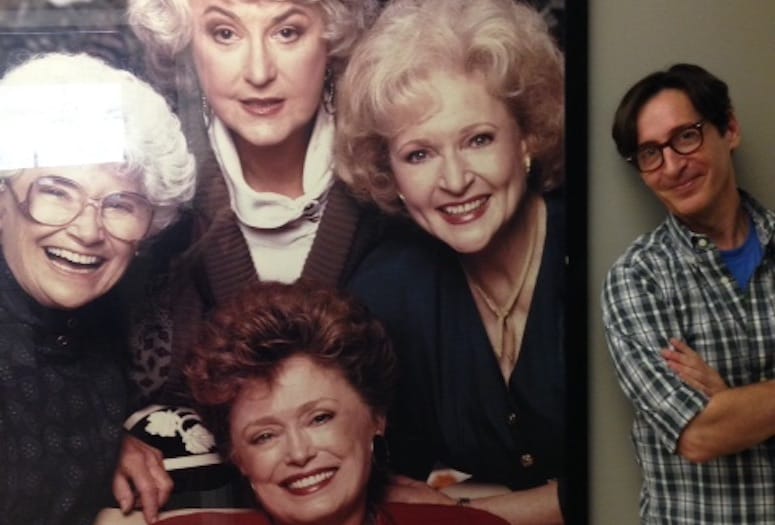
The Golden Girls, one of the most beloved sitcoms of all time, quickly resonated with the LGBTQ+ community due to its stars Betty White, Estelle Getty, Rue McClanahan, and Bea Arthur. But in 1985, when Season 1 began airing, the environment surrounding the making of the show wasn’t so supportive for its gay writers, who started on staff without being out to their co-workers. Stan Zimmerman and his writing partner, James Berg, decided to open up in a local paper.
“Our representatives thought it was a bad idea, but it was a relief for us to finally come out,” Zimmerman tells The Blade. “It’s hard to go to work and be yourself, especially in a job where you have to open your heart and mind and be open to talking about things that you were going through to then create episodes around. Imagine going to work, and you can’t divulge anything. How can you really bring your best talents to the table?”
Starting out the new year, Zimmerman reflects on the show’s 40th anniversary and continued impact. The Blade spoke with Zimmerman about his experience coming out while working on Season 1 of The Golden Girls, dining with Estelle Getty, and writing on Roseanne — notably the Season 6 episode Don’t Ask, Don’t Tell that featured a kiss between two women and prompted outrage from the network. (This interview has been edited and condensed.)
As people have celebrated The Golden Girls turning 40 in 2025, what’s on your mind as you look back?
Of course, tons of memories. But talking about the 40th anniversary, when going into a career, I just wanted a job. And then pretty early on, I landed on the first season of The Golden Girls, and that was more than a job — it changed my life. At the time, you don’t think you’re gonna be talking about it forty years from now, especially when you’re super young like I was. You just want to be able to buy food and pay for living. Then you see that show go through so many renaissances and see new audiences come to it. You know, that first wave was, “Wait, you’re too young to have watched the show. How do you know about it?” And then these waves kept coming and coming. But I feel like right now, this is the biggest wave ever. The show is more popular today than it was back then, and you just see so many generations of people enjoying it and so many age groups. I’ve been involved in television for a long time, and luckily, been involved in a number of big hit shows, yet the thought that one show could attract young kids all the way to older people is pretty wild. With most shows, you only aim for a certain demo.
I have luckily heard so many beautiful stories, especially of LGBTQ+ members sharing their Golden Girls viewings with grandparents. It was such a great way to bond and laugh, and also touch upon a lot of subjects that you probably would not bring up at the dinner table. You’re laughing with them, or you’re seeing characters come out of the closet, and you’re watching these older characters in the show work through them, realizing how important these family members and friends are in their lives.
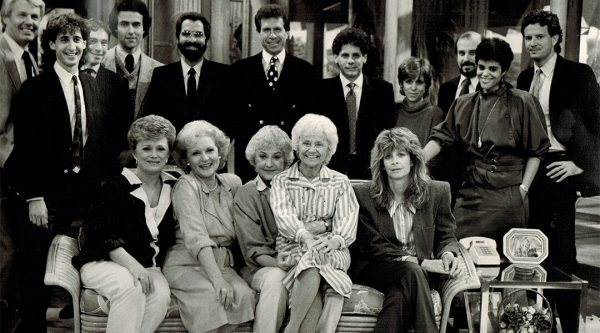
The path to getting into a writers’ room back in 1985 must’ve been so different than what it’s like starting out now. How did you get your foot in the door with a staff job on The Golden Girls?
It’s so funny that you would use the phrase “Foot in the door.” My grandmother must be speaking through you because she always said to me, “Just get your foot through the door, Stanley!” This was after Golden Girls, and I said, “I think my foot’s in the door, I’m trying to shove the rest of my body in.” Obviously, when I started out, there were nights that were just four sitcoms in a row on one network. And for many years, we would have multiple offers to go on a TV series. Now, we’re lucky if there are two or three comedies. There were just more places for us to learn. I’ve always said that Golden Girls was like our college writing 101 classes — how do you write a TV comedy? We were also doing 22-24 episodes a season, so that repetition of learning structure was so fundamental to my growth as a TV writer. Today, writers are lucky if they do six episodes a season. We did a sitcom that we created called Rita Rocks. We did 40 episodes. Then, it was two seasons, and it was OK, a middling success. But if you did 40 episodes of a show now, that would be huge.
You see a few shows now, like Abbott Elementary, that have big season orders and return yearly. But now everything’s a limited series, six or eight episodes. You just don’t get to spend as much time with the characters, which is part of what we love about TV.
And as a writer, we love it because you really get to explore all the different facets of characters and paint them into corners and see how they get out of it. That was really exciting. But also the flip side of that is that at the end of the season, you were exhausted. You had a table read on Monday, and you were filming it on Friday, come hell or high water. You stayed as late as it took.
I gave up a lot of my personal life to work on TV shows. Sometimes, as we get older, we question what could have been, but I loved every moment of it, even the ones that were a little more challenging, like being on Roseanne and dealing with her, and delving into so many interesting storylines. Especially the lesbian kiss episode, which we wrote.
People think of Golden Girls as a very progressive show with a big queer audience, yet, especially in that first season, I know being gay was taboo in the industry. When do you think studio execs started realizing how much the show was resonating with queer people?
I remember going through West Hollywood on a Saturday night when the show was on, and there’d be nobody on the street because they were all in the bars, watching the show on monitors. And I will have to admit, occasionally, I would drop the Golden Girls credit to see if I could get a free martini — that might have worked here and there. But years later, I’d go to gay bars and still see clips of my shows or just meet LGBTQ+ people who knew every word of the scripts. That was really fascinating that it resonated with the audience so much.
And I got to know Estelle Getty, who played Harvey Fierstein’s mother on Broadway in Torch Song Trilogy. She was very friendly with the gay community and would invite me out to dinner, and I got very excited. There’d be 20 gay men, all actors from different companies of Torch Song. She just felt very comfortable being in the company of a gay man.
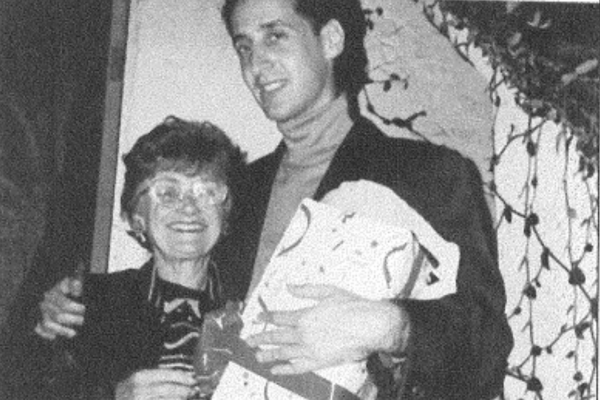
After you came out as gay in the ‘80s, there was a lot of press attention. What was your experience with that?
Back then, it was a big deal if you came out. Obviously, we weren’t household names or actors whose faces were on cameras — those people had to come out on magazine covers. Many of my friends who were actors who were gay or lesbian had to come out in their own way, or else a lot of the tabloids were going to out them anyway. So we got to pick when we wanted to come out, and it was an article in a local paper.
It was a relief, but then for a while, it just opened up the discussions to those writers’ rooms, who were mostly male writers. They just had a zillion questions, all day long. They’d be asking us gay questions, and we’d be like, “Can we write the show and not talk about something gay?” Or we would be at Paramount in an office, and there’d be a window, and a beautiful girl would walk by. The writers would go, “Nothing?” and we’re like, “No.” And then when a hot guy walked by, we’d go to them, “Nothing?” So it got some lively discussions going in the room, which was cool that we got to share that and open up a lot of minds and hearts. Then, turning to a show like Roseanne, Tom Arnold would be running up and down the halls yelling, “Where are my gay guys?” — meaning James Berg and me. And we just kept thinking, “Oh, my God, you can’t say that out loud.” Today, there’d obviously be a lawsuit if you said that.
I wanted to ask you about Roseanne, specifically the Don’t Ask, Don’t Tell episode in Season 6. The network threatened not to air the episode. What was your experience writing that episode and then facing the industry’s reaction?
We knew it would be an interesting episode because Roseanne Barr, on the show and in real life back then, was very open and liberal. So we thought about what story we could give her where we questioned that. If she got kissed by a woman, was she comfortable with that? How did people in her life react? We had no idea that the network would balk at that because it was just a nanosecond of a kiss. ABC flat out said, “We’re not going to let you film it.” Why? What did they think would happen?
You look at the parallels to today. Why do we not want drag queens reading children’s books to kids? Back then, were they afraid that if they saw two women kiss that every woman would turn into a lesbian? It’s so preposterous when you really think about it. We watched a lot of straight entertainment growing up. Did we turn out straight? It’s really about changing their minds and getting people to wake up to what the reality is. There always was and always will be LGBTQ+ people in our society. The sooner we embrace that, I think our society can start to move forward.
You talked about your experience in the writers’ room on The Golden Girls. What was your experience writing on Roseanne, and how was it different?
Golden Girls was terrifying because it was a small writers’ room, but we knew we were writing for four of the best actresses on TV of all time. So there was that pressure. And when the ratings started exploding, I think NBC and the producers knew that they had a piece of gold they had to hold on to. So they were very careful to make sure that every word that went down on set was brilliant. With Roseanne, she had 21 writers on staff, so Tom Arnold and Roseanne Barr, who were married at the time, would bring in their stand-up comedy friends like Norm Macdonald, who had not written for TV at all. We kind of had to teach them how to write for television. Some of those rooms were very intimidating because they were stand-up comedy people who just opened their mouths and were [naturally] funny.
Some rooms I felt really comfortable in and could talk. In other rooms, I just felt so quiet and afraid to speak. Then there was a lot of dysfunction on set when we would have to go down there. Roseanne Barr just created this work environment of fear because we were told, “If she sees the whites of your eyes, you might get fired. So just stand behind the tallest person.” Then, of course, we go and write this lesbian kiss episode. She wanted to know who the hell wrote that, and suddenly, we were thrown at her. But luckily, she just loved it and fought for it. Tom and her got it on ABC, and I will always be thankful to them for that, no matter what her politics are now.
Earlier, we talked about fewer comedies airing on TV in this changing landscape. Across the years you’ve worked in comedy, what have you noticed about the evolution of the sitcom and why there are so few today?
There’s more opportunity in streaming to have really interesting comedies. It’s old now, but I really like a show like Girls by Lena Dunham. But as far as network television, they completely dropped the ball. They got so nervous about offending anybody or taking chances that they became so safe and stale with regurgitated jokes. I would watch or attempt to watch new sitcoms, and it felt like they were using the same writers, and the writers were using the same jokes, and the set-ups for the shows were just the same. When they saw audiences fleeing to streaming, they should’ve taken that opportunity and trusted writers of all ages. There’s no way to predict whether a show is going to be a hit or not — you can do all the testing.
Networks were and are still very afraid of any LGBTQ+ content. We wrote a show on spec called Skirtchasers about a father and his lesbian daughter who both chased women and cheated on those women. Everybody loved the script and had never heard anything like it before, but we were told, “We already have our one gay show this season.”
In recent memory, what are some queer shows or films that you think have done an excellent job with representation? Or just any queer creators or writers you’ve been impressed by.
Actually, last night I watched that Heated Rivalry. It is so freakin’ hot, and it’s so subtle and interesting. I kept thinking I’d be bored, but I just like the pace of it. The actors are good, and it’s obviously very sexy. Then you have the gay sensibility for something like The Gilded Age, which is not a comedy, but I just love the cast. It’s the straightest gayest cast ever! It’s a Broadway wet dream. The show is also produced and directed by Michael Engler, a very good friend of mine who I went to NYU with. I asked him to direct the first play I wrote. I’m so proud watching that show and seeing the twists and turns it’s taking. The White Lotus is a phenomenon on its own, so I do love that. Hacks is really fun — I mean, anything Jean Smart does. We were lucky to have her in the first Brady Bunch Movie.
You mentioned your first play, and most recently, you’ve been working in theater and doing advocacy work. What inspired that?
Especially after COVID, I just love the idea of being in the theater with live people having this experience that is so unique to that one performance — it will never, ever be the same. Luckily, my TV career has enabled me to be able to go off and do theater. I created the play Right Before I Go, which is my suicide awareness play, using real suicide notes and also telling the story of a very close friend of mine who died by suicide 15 years ago. I’ve been traveling the United States with it, and made my off-Broadway acting and playwriting debut this past September, which was Suicide Prevention Month. It had a lot of queer actors in it: Wilson Cruz, Maulik Pancholy, Danny Pintauro, and then gay icons like Wendy Malik from Hot in Cleveland and Christine Taylor from The Brady Bunch Movie. That was really impactful, and I feel needed. In New York, audiences kept saying during our talkback that there’s no other theater like this that gives you a safe space to watch a show like this and then talk about it with a local mental health professional on stage.
When you get involved in projects, it takes so much of your life. I want to go out and either make people laugh, cry, but be moved. And that’s very exciting to sit in the theater and realize they’re having these emotions because of something that I created.
a&e features
Looking back at the 10 biggest A&E stories of 2025
‘Wicked,’ Lady Gaga’s new era, ‘Sexy’ Bailey and more
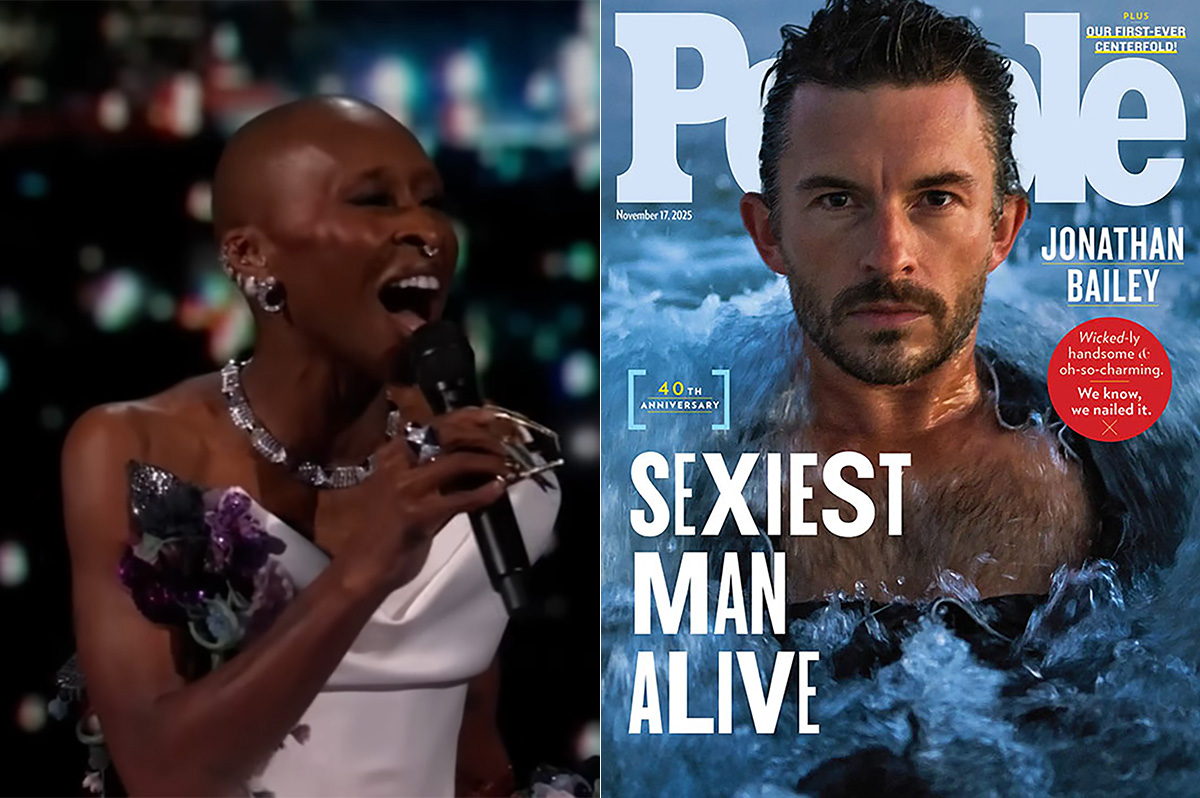
Although 2025 was a year marked by countless attacks on trans rights and political setbacks, the year also saw brilliant queer artists continuing to create art. From Cannes and Sundance Award winners now vying for Oscar consideration to pop icons entering new stages of their careers, queer people persevered to tell their stories through different media.
With the state of the world so uncertain, perhaps there’s no more vital time to celebrate our wins, as seen through some of this year’s top pop culture moments. While there’s no collection of 10 stories that fully encompass “the most important” news, here are some events that got the gays going:
10. ‘Mysterious Gaze of the Flamingo’ wins big at Cannes
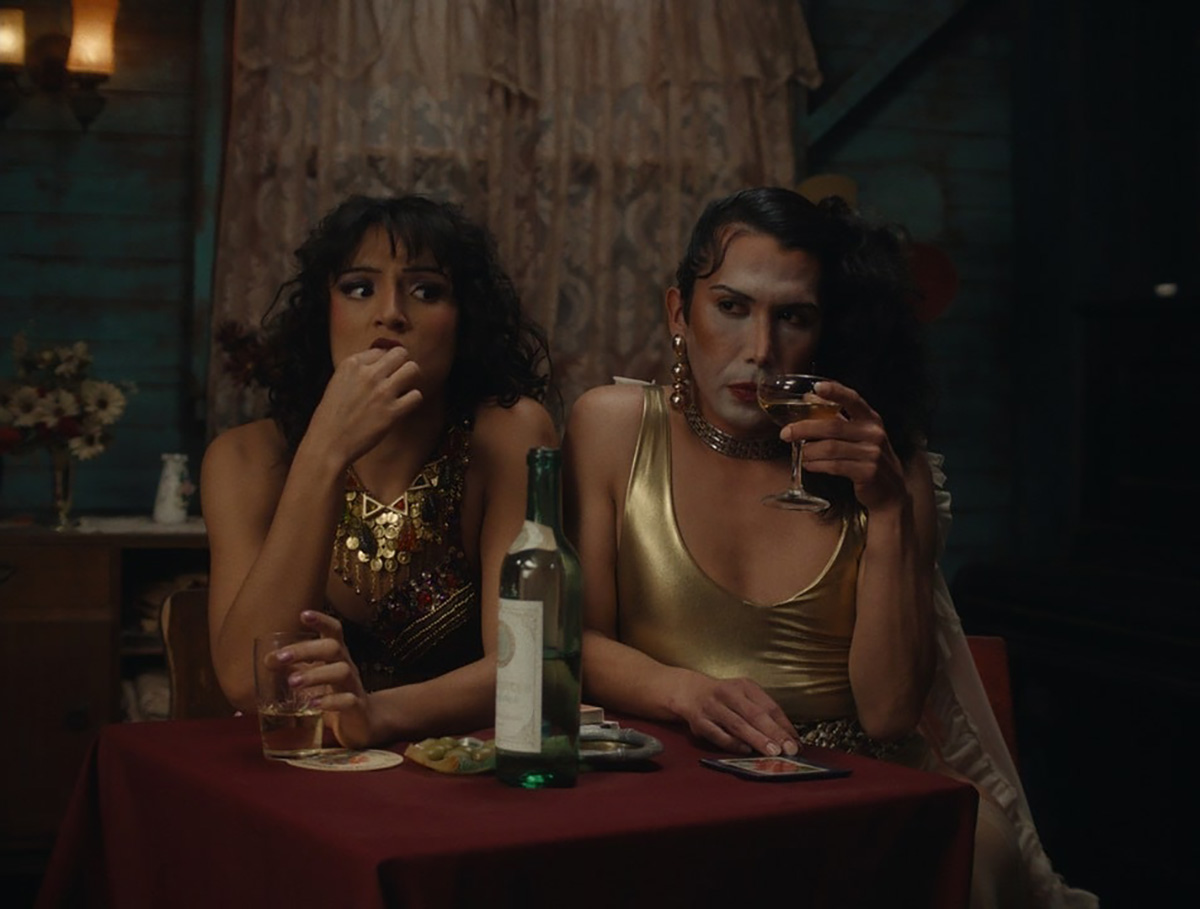
The Cannes Film Festival has become a crucial start for films hoping to make their way to the Oscars, and first-time director Diego Céspedes won the top Un Certain Regard prize for his intimate western “The Mysterious Gaze of the Flamingo.” The film is set in the ‘80s and is intended as an allegory for the AIDS epidemic. Seeing a film that unpacks vital queer history win one of the most coveted awards at Cannes has been a huge point of pride in the independent filmmaking community.
Since the film bowed at Cannes, it has been selected as Chile’s Oscar entry in the Best International Feature race. Speaking with The Blade during the film’s AFI Fest run in October, Céspedes said: At first, I was kind of scared to have this campaign position in the times that we’re living [in] here. But at the same time, I think the Oscars mean a huge platform — a huge platform for art and politics.”
9. ‘The Last of Us’ returns for an even gayer season 2
While the first season of The Last of Us gave us one of TV’s most heartbreaking queer love stories in the episode “Long, Long Time,” Season 2 doubled down on its commitment to queer storytelling with the blossoming relationship between Ellie (Bella Ramsey) and Dina (Isabela Merced). The show expanded on the pair’s relationship in the original video game, making it perhaps the central dynamic to the entire season. That unfortunately came with more homophobic backlash on the internet, but those who checked out all the episodes saw a tender relationship form amid the show’s post-apocalyptic, often violent backdrop. For their performance, Ramsey was once again nominated for an Emmy, but Merced deserved just as much awards attention.
8. ‘Emilia Pérez’ sparks controversy
Jacques Audiard’s genre-bending trans musical “Emilia Pérez” proved to be an awards season juggernaut this time last year, winning the Golden Globe for Best Musical/Comedy. But when the lead star Karla Sofia Gascón’s racist, sexist, and homophobic old tweets resurfaced, the film’s Oscar campaign became a tough sell, especially after Netflix had tried so hard to sell Emilia Pérez as the “progressive” film to vote for. Mind you, the film had already received significant backlash from LGBTQ+ audiences and the Mexican community for its stereotypical and reductive portrayals, but the Gascón controversy made what was originally just social media backlash impossible to ignore. The only person who seemed to come out of the whole debacle unscathed was Zoe Saldaña, who won the Oscar for Best Supporting Actress over Ariana Grande.
7. ‘Sorry, Baby’ establishes Eva Victor as major talent
Back in January at the Sundance Film Festival, Eva Victor (known by many for her brand of sketch comedy) premiered their directorial debut “Sorry, Baby” to rave reviews, even winning the Waldo Salt Screening Award. Victor shadowed Jane Schoenbrun on the set of “I Saw the TV Glow,” and seeing Victor come into their own and establish such a strong voice immediately made them one of independent cinema’s most exciting new voices. A memorable scene in the film sees the main character, Agnes (played by Victor), struggling to check a box for male or female, just one example of how naturally queerness is woven into the fabric of the story.
Most recently, Victor was nominated for a Golden Globe for her performance in the film, and she’s represented in a category alongside Jennifer Lawrence (“Die My Love”), Jessie Buckley (“Hamnet”), Julia Roberts (“After the Hunt”), Renate Reinsve (“Sentimental Value”) and Tessa Thompson (“Hedda”). The film also received four Independent Spirit Award nominations overall.
6. Paul Reubens comes out in posthumous doc
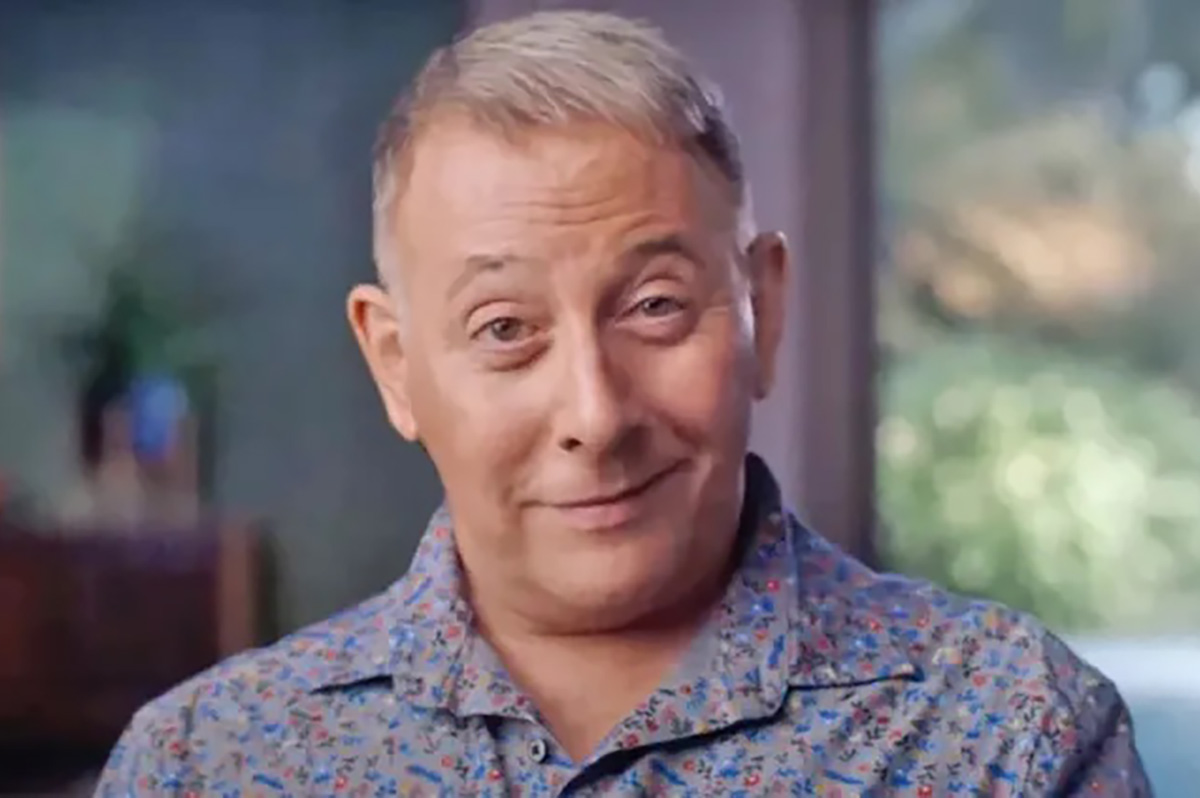
While Paul Reubens never publicly came out as gay before passing away in 2023, the two-part documentary “Pee-wee as Himself” premiered back in May on HBO Max, giving the legendary comedian a chance to posthumously open up to the world. Directed by Matt Wolf, the documentary explores how Reubens found his alter ego Pee-Wee Herman and why he kept his private life private.
The documentary won an Emmy in the Outstanding Documentary or Nonfiction Special category and remains one of the most critically acclaimed titles of the year with a 100% Rotten Tomatoes score. Also worth noting, the National Geographic documentary Sally told the posthumous coming out story of Sally Ride through the help of her long-time partner, Tam O’Shaughnessy.
5. Lady Gaga releases ‘Mayhem’
Lady Gaga entered a new phase of her musical career with the release of Mayhem, her seventh album to date. From the frenzy-inducing pop hit Abracadabra to the memorable Bruno Mars duet featured on “Die With a Smile,” seeing Gaga return to her roots and make an album for the most die-hard of fans was especially rewarding after the underwhelming film releases of “House of Gucci” and “Joker: Folie à Deux.” Gaga has been touring with The Mayhem Ball since July, her first arena tour since 2018. She even extended her tour into 2026 with more North American dates, so the party isn’t stopping anytime soon. And Gaga is even set to make an appearance next May in “The Devil Wears Prada 2.”
4. Cynthia Erivo, Ariana Grande perform at the Oscars
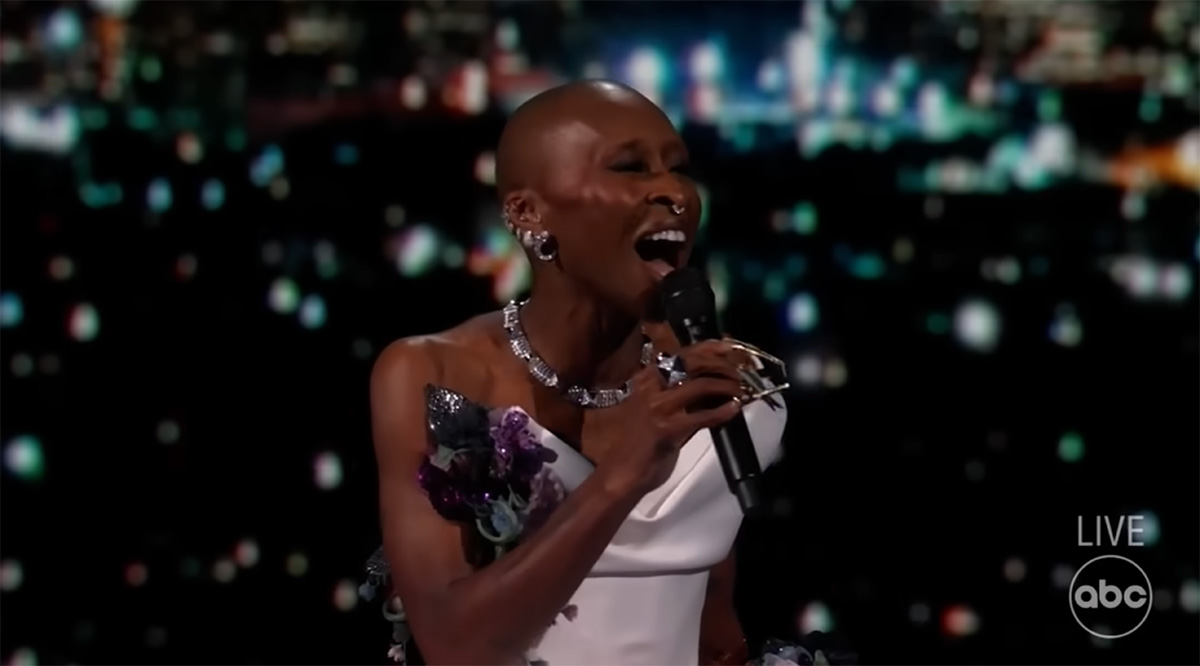
While “Wicked: For Good” didn’t quite reach the heights of the first film, we will forever have Cynthia Erivo and Ariana Grande’s breathtaking live performance that opened the 97th Academy Awards. The pair sang a rendition of “Over the Rainbow,” “Home,” and “Defying Gravity,” paying proper homage to the original 1939 “Wizard of Oz.” Even non-Wicked fans can’t deny how magical and brilliantly staged this performance was. With both Erivo and Grande up for acting Oscars last year, they’re hoping to repeat success and make history with consecutive nominations. Either way, let’s hope there’s another live performance in the making, especially with two new original songs (The Girl in the Bubble and No Place Like Home) in the mix.
3. Indya Moore speaks out against Ryan Murphy
Indya Moore has consistently used social media as a platform for activism, and in September, posted a 30-minute Instagram live speaking out against “Pose” co-creator Ryan Murphy. Moore claimed that Murphy wasn’t being a true activist for trans people. “Ryan Murphy, we need you to do more. You need to address the racism, the violence, and the targeting of people on your productions, Ryan Murphy. You do need to make sure trans people are paid equally. Yes, Janet did the right thing,” Moore said. Murphy was also back in the headlines this year for the critically panned “All’s Fair” and the controversial “Monster: The Ed Gein Story” starring Laurie Metcalf and Charlie Hunnam.
2. Cole Escola wins Tony for Best Leading Actor
Few pop culture moments this year brought us together more than Cole Escola winning a Tony award for “Oh, Mary!” the Broadway show they created, wrote and starred in (we love a triple threat!) Escola made history by becoming the first nonbinary person to win a Tony in the leading actor category, and seeing them excitedly rush to the stage wearing a Bernadette Peters-inspired gown instantly became a viral social media moment.
The cherry on top of Escola’s major moment is the recent news that they are writing a Miss Piggy movie with Jennifer Lawrence and Emma Stone producing — news that also broke the internet for the better. We cannot wait!
1. Jonathan Bailey makes gay history as ‘Sexiest Man Alive’
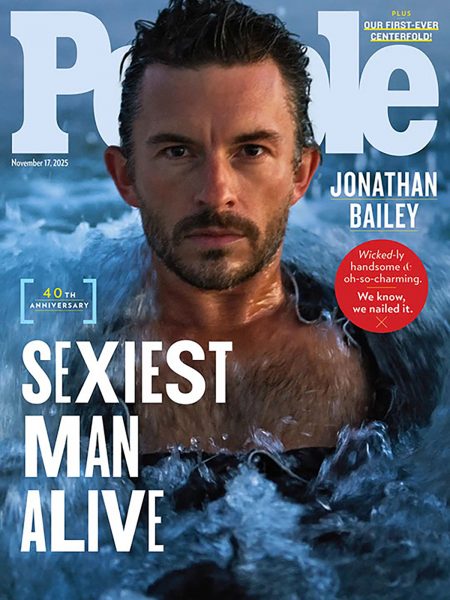
The same year as his on-screen roles in blockbusters “Jurassic World Rebirth” and “Wicked: For Good,” Jonathan Bailey made history as the first openly gay man to be named People magazine’s “Sexiest Man Alive.” The fact that it took 40 years for an openly gay man to earn the title is a signifier of how far we still have to go with queer representation, and seeing Bailey celebrated is just one small step in the right direction.
“There’s so many people that want to do brilliant stuff who feel like they can’t,” he told PEOPLE, “and I know the LGBT sector is under immense threat at the moment. So it’s been amazing to meet people who have the expertise and see potential that I could have only dreamed of.” In 2024, Bailey founded the charity titled The Shameless Fund, which raises money for LGBTQ+ organizations.
-
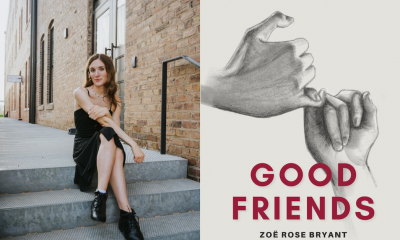
 Books3 days ago
Books3 days agoZoë Rose Bryant on her chart-topping debut novel ‘Good Friends’ and inspiring young trans people online
-

 Los Angeles3 days ago
Los Angeles3 days agoNikko LaMere’s photo exhibit “JOY!” documents the euphoria of Black queer nightlife
-

 Viewpoint3 days ago
Viewpoint3 days agoGay acceptance in US takes a dangerous reversal
-

 a&e features1 day ago
a&e features1 day agoTello Films: Celebrating 19 years of lesbian storytelling
-

 Commentary4 days ago
Commentary4 days agoValentine’s Day, Alone
-

 National3 days ago
National3 days agoLGBTQ+ activists mourn the Rev. Jesse Jackson
-

 Commentary3 days ago
Commentary3 days agoPost-Valentine’s Day: Are your standards protecting you — or keeping you single?
-

 Movies2 days ago
Movies2 days agoEva Victor winning best screenplay, Erin Doherty winning supporting actress, and more queer highlights of the 2026 Film Independent Spirit Awards
